#but physically disabled people make their own term
Explore tagged Tumblr posts
Text
Calling anything that isn't trans-exclusionary "terf behavior" is bad maybe
#id like to know how many actual trans ppl are doing thus#bc im not#and it says a lot if its allies doing it#just consider:#that the issues we face#arent a springboard for your other 'concerns'#and that closed groups or practices are in fact not terfy#for being closed#and that maybe you need to accept that not all clubs and identities are for you#or at the very least that you will experience pushback for entruding on those spaces#ffs ppl love to condemn straights for being in a queer space#but physically disabled people make their own term#*joker voice* and everyone loses their minds
0 notes
Text
vent in tags
#im just going to type out my own animalistic thoughts in terms of my intense fatigue and etc#i might make a doodle comic ab it... idk#but its like. oh my god its relentless. its horrible#and its like im grasping with my claws at this but i dont want ppl to just understand that its hard#i want them to feel it i want you to feel this the way i do and know that its my feelings#like physically feel this torment. i just want someone to have a taste but not for long#but the longevity is part of the issue#anyway im just feeling like theres no escaping this. i can be strong mostly but its gotten worse#worse since ive tried picking up a different job#ill never amount to who i wanted to be and who i worked so hard to be#now my own 62 year old disabled father can accomplish more than me.#half blind#broken hip#several other things. i cant even take care of my own father properly#i want a way out that doesnt involve death but it doesnt exist! i want to live!#i want to live for other people#i want to make it easy on others but im the one making it hard#ok thats enough for now.#im going to watch some isaac youtube and doodle some things out and. well i hope tomorrow is better
0 notes
Text
also in regards to that last article about varied ways of thinking about psychosis/altered states that don't just align with medical model or carceral psychiatry---I always love sharing about Bethel House and their practices of peer support for schizophrenia that are founded on something called tojisha kenkyu, but I don't see it mentioned as often as things like HVN and Soteria House.

ID: [A colorful digital drawing of a group of people having a meeting inside a house while it snows outside.]
"What really set the stage for tōjisha-kenkyū were two social movements started by those with disabilities. In the 1950s, a new disability movement was burgeoning in Japan, but it wasn’t until the 1970s that those with physical disabilities, such as cerebral palsy, began to advocate for themselves more actively as tōjisha. For those in this movement, their disability is visible. They know where their discomfort comes from, why they are discriminated against, and in what ways they need society to change. Their movement had a clear sense of purpose: make society accommodate the needs of people with disabilities. Around the same time, during the 1970s, a second movement was started by those with mental health issues, such as addiction (particularly alcohol misuse) and schizophrenia. Their disabilities are not always visible. People in this second movement may not have always known they had a disability and, even after they identify their problems, they may remain uncertain about the nature of their disability. Unlike those with physical and visible disabilities, this second group of tōjisha were not always sure how to advocate for themselves as members of society. They didn’t know what they wanted and needed from society. This knowing required new kinds of self-knowledge.
As the story goes, tōjisha-kenkyū emerged in the Japanese fishing town of Urakawa in southern Hokkaido in the early 2000s. It began in the 1980s when locals who had been diagnosed with psychiatric disorders created a peer-support group in a run-down church, which was renamed ‘Bethel House’. The establishment of Bethel House (or just Bethel) was also aided by the maverick psychiatrist Toshiaki Kawamura and an innovative social worker named Ikuyoshi Mukaiyachi. From the start, Bethel embodied the experimental spirit that followed the ‘antipsychiatry’ movement in Japan, which proposed ideas for how psychiatry might be done differently, without relying only on diagnostic manuals and experts. But finding new methods was incredibly difficult and, in the early days of Bethel, both staff and members often struggled with a recurring problem: how is it possible to get beyond traditional psychiatric treatments when someone is still being tormented by their disabling symptoms? Tōjisha-kenkyū was born directly out of a desperate search for answers.
In the early 2000s, one of Bethel’s members with schizophrenia was struggling to understand who he was and why he acted the way he did. This struggle had become urgent after he had set his own home on fire in a fit of anger. In the aftermath, he was overwhelmed and desperate. At his wits’ end about how to help, Mukaiyachi asked him if perhaps he wanted to kenkyū (to ‘study’ or ‘research’) himself so he could understand his problems and find a better way to cope with his illness. Apparently, the term ‘kenkyū’ had an immediate appeal, and others at Bethel began to adopt it, too – especially those with serious mental health problems who were constantly urged to think about (and apologise) for who they were and how they behaved. Instead of being passive ‘patients’ who felt they needed to keep their heads down and be ashamed for acting differently, they could now become active ‘researchers’ of their own ailments. Tōjisha-kenkyū allowed these people to deny labels such as ‘victim’, ‘patient’ or ‘minority’, and to reclaim their agency.
Tōjisha-kenkyū is based on a simple idea. Humans have long shared their troubles so that others can empathise and offer wisdom about how to solve problems. Yet the experience of mental illness is often accompanied by an absence of collective sharing and problem-solving. Mental health issues are treated like shameful secrets that must be hidden, remain unspoken, and dealt with in private. This creates confused and lonely people, who can only be ‘saved’ by the top-down knowledge of expert psychiatrists. Tōjisha-kenkyū simply encourages people to ‘study’ their own problems, and to investigate patterns and solutions in the writing and testimonies of fellow tōjisha.
Self-reflection is at the heart of this practice. Tōjisha-kenkyū incorporates various forms of reflection developed in clinical methods, such as social skills training and cognitive behavioural therapy, but the reflections of a tōjisha don’t begin and end at the individual. Instead, self-reflection is always shared, becoming a form of knowledge that can be communally reflected upon and improved. At Bethel House, members found it liberating that they could define themselves as ‘producers’ of a new form of knowledge, just like the doctors and scientists who diagnosed and studied them in hospital wards. The experiential knowledge of Bethel members now forms the basis of an open and shared public domain of collective knowledge about mental health, one distributed through books, newspaper articles, documentaries and social media.
Tōjisha-kenkyū quickly caught on, making Bethel House a site of pilgrimage for those seeking alternatives to traditional psychiatry. Eventually, a café was opened, public lectures and events were held, and even merchandise (including T-shirts depicting members’ hallucinations) was sold to help support the project. Bethel won further fame when their ‘Hallucination and Delusion Grand Prix’ was aired on national television in Japan. At these events, people in Urakawa are invited to listen and laugh alongside Bethel members who share stories of their hallucinations and delusions. Afterwards, the audience votes to decide who should win first prize for the most hilarious or moving account. One previous winner told a story about a failed journey into the mountains to ride a UFO and ‘save the world’ (it failed because other Bethel members convinced him he needed a licence to ride a UFO, which he didn’t have). Another winner told a story about living in a public restroom at a train station for four days to respect the orders of an auditory hallucination. Tōjisha-kenkyū received further interest, in and outside Japan, when the American anthropologist Karen Nakamura wrote A Disability of the Soul: An Ethnography of Schizophrenia and Mental Illness in Contemporary Japan (2013), a detailed and moving account of life at Bethel House. "
-Japan's Radical Alternative to Psychiatric Diagnosis by Satsuki Ayaya and Junko Kitanaka
#personal#psych abolition#mad liberation#psychosis#altered states#antipsych#antipsychiatry#mad pride#peer support#schizophrenia#i have a pdf of the book somewhere if anyone wants#the book and the documentary also discuss some of the pratical struggles in creating a community like this which i also found helpful as#someone who is very interested in helping open a peer respite.
2K notes
·
View notes
Text
One thing I rarely see in injury and chronic pain fics is the grief that comes with missing out on stuff you love because you can no longer do them without hurting yourself. Writers who have been disabled their whole lives (or at least a long time) tend to forget that not all disabled people are used to being disabled. For able-bodied characters, especially athletic ones like vigilantes, a serious injury could mean a jarring change that includes giving up the things that mean the most to them.
I was physically fine until I was 18. Back then, my sense of self was entwined with interests that required a lot of movement and dexterity. I started doing MMA in middle school for self-defense. I loved parkour and even had a few hundred subscribers on my old YouTube channel. I learned to shoot and was gifted my first gun when I was 16. I took up multiple instruments. You get the idea.
My motorcycle accident fucked up the joints on my left side—my knee and shoulder especially, but also wrist to an extent. When it first happened, I thought I'd be on crutches for a bit but things would eventually get back to normal. The pain didn't go away even after I got rid of the crutches but I figured it was just residual and I should do what I'd been doing before. It's why I turned to substances—to block the pain and do what I love, but that's another topic. I didn't recognize my injury as a disabling thing until the end of the pandemic, when I put my parkour channel on an indefinite hiatus because it was seriously wearing my body down. It might sound silly to you but I was devastated. It's like if Spider-Man wasn't allowed to swing from buildings. It took me a long time to make peace with losing that part of me.
Another piece of that grief is even when you can do stuff, it's not the same because you have to exclude certain aspects of it for your own health. It's like the Robin that died and came back wrong. I can't use certain gym equipment and I have to tell my sparring partners what to avoid. I don't go to the shooting range much now because I can't extend my arm and hold a rifle for the amount of time it takes to aim without it starting to hurt. I'm a drummer, but I need breaks throughout the setlist and I can't do anything too fast or complex with the pedals, which means I can't play some of my favorite songs and my band is limited in what we write and perform. I can't take my motorcycle on road trips without frequent rest stops. Making accommodations helps physically, but emotionally, they're not always easy to accept because that means accepting the pain as a long-term disability rather than a temporary setback.
This got super long because I think it's unexplored in fics so some tips for creators:
First, learn how the body works and how stupidly fast and easy it is to get hurt. Mine was on a residential road because I didn't pay attention for 0.2 seconds
Learn the difference between internalized ableism and being upset over becoming disabled. I think a lot of writers skip over the feelings someone would naturally experience because it can be construed as ableism. Let them be in denial, sad, angry, etc. upon finding out because acceptance almost never happens right away. That's different from being a dick to themselves or others based on disability
Also, not everyone uses the same labels or has the same vocabulary to describe themselves. Different characters will have different ways of describing depending on their personality, level of knowledge, where they come from, and their relationship with their disability. I still don't really call myself disabled since I don't have it as bad as others so I tell people what happened instead (anyone who says "differently abled" will receive a different ability from me in the Denny's parking lot)
Think about how they cope with their new disability. Do they realize it's a disability right away? Do they talk to someone? Search desperately for a cure? Numb the pain? Turn to alternative methods? Do they worry about something else first, like money? Do they develop something else because of it, like a mental illness? Again, coping poorly is not ableism
What stays the same and what changes? I think about the difference between Forrest Gump and Lieutenant Dan after they were both wounded in battle
If they have a passion they can no longer pursue, it doesn't make much sense for them drop it so readily. Maybe they find a way to continue with accommodations (a good place to get creative!). Maybe they try and push through anyway. If they do ultimately resign, include the thought process and internal conflict behind it
#writers on tumblr#writeblr#writing#writing advice#writing tips#creative writing#fanfic tropes#fanfic#fanfiction#comic fandom#multi fandom#fandom#injury#chronic pain#disability#disabilties#disabled#dc comics#marvel#personal#writing resources#writing reference#grief#opinion#tw swearing#long post
638 notes
·
View notes
Text
„Astarion ending as the Vampire Ascendant is the correct ending for him, because it is what he wants.”

That is a claim I’ve been seeing pop up more and more often these days. And I think it’s both a very bold and a very odd claim to make.
But first things first: Hello, I’m a licensed social worker! So far, I’ve worked with children, refugees and youths with behavioural issues stemming from bullying and or abuse.
Please be aware that I will be mentioning different kinds of abuse, coping mechanisms, and victim/abuser relationships. If any of this is difficult for you, don’t force yourself through it. My jabbering about a traumatised vampire is not worth your wellbeing, not ever.
I will, however try to stick to Astarion and not use other examples. If, in any case, I do use a non-Astarion example, I’ll add a warning beforehand so that you can skip the part. And I’ll make it clear what will be discussed in the next bit, so that you have a chance to skip it entirely.
This is an effort to make this as accessible as possible for everyone that wants to indulge on a mad woman’s rambling – and I know there’s a few people that like this sort of stuff!
And, uh, there's obviously spoilers for all three acts. Serious spoilers, even.
Before I can get into the whole ‘why Astarion didn’t really want to ascend,’ we need to understand him a little more. And to understand this pretty boy’s brain, we first need to understand the gist of what we’re talking about when we throw around the word ‘abuse.’
“Abuse” is when someone is treated with cruelty, violence, or neglect – often to bad effect – on a regular basis. Repetitively. Check’s out for Astarion, I’d say, but we all knew that already. I mean, if one thing was obvious, it was this.
1. Astarions Abuse
Next we need to look at what kind of abuse Astarion faced over his long years of torment, seeing as different types of abuse will have different effects on the victim.
Not that that is anything we have to worry about with him – Astarion won the abuse lottery, to put it bluntly. In a horrible game of fate, he got everything. He himself indirectly mentions all the types of abuse he faced, albeit never using the correct terms.
The first we properly notice – fitting, seeing as it is often the most obvious form of abuse – is the physical abuse. Astarions scars are probably the biggest tell Larian could shove down our throats, only underlined by Astarion’s tale about the night itself. About how Cazador ‘misspelled something’ every time he flinched or screamed and had to do ‘many corrections. On top of this, Cazador locked Astarion up for months on end and tortured him – or had him tortured – on a regular basis both as a rite and as a punishment.
Next up, we have the fact that Astarion was forced to basically prostitute himself repeatedly. This is what we call sexual exploitation.
“I spent two hundred years using my body to lure pretty things back for my Master.” – Act 2
Two hundred years is a long time, filled with great many people. Now, we don’t know how many of those people actually tapped into the sexual exploitation and how many he could just lure back with other means, but the fact that it happened a lot is undeniable.
Next we have a form of abuse that we often disregard in adults: Neglect. It sounds odd, I know, saying that a fully grown adult was neglected. They can care for themselves, can they not?
Well. Yes and no.
Adult neglect is proceeded by the condition that one adult has to lean on another adult to fulfil their needs for whatever reason. This could be anything, from disability to income-based issues.
Seeing as Astarion had absolutely nothing, while Cazador had everything, we can assume this was the case. Cazador had the house, the money, the power. Astarion owns but one pair of clothes, assumedly, that he has fixes over and over again. Fair to say, that’s pretty neglectful. (And it’s one more reason to shower the guy in pretty armour and camp clothes. Go ham, people.)
Last we have the form of abuse we actually get to witness later in the game – emotional abuse.
Once again, it’s undeniable that this happened. Especially since we’re all seeing it in the flesh upon meeting Cazador in his crypt.
“Have you no respect for yourself?”
“I strove for perfection in all things. Even those as imperfect as you.”
“A pity you amounted to so little, despite my efforts.”
“A pathetic little boy who never amounted to anything.”
All Act 3, Crypt
Here we have just a few examples of things Cazador throws in his face. It’s like reading a textbook on emotional abuse, this one (and it’s definitely a reason to throw hands).
Blaming the victim, keeping their sense of self and their self-worth as tiny as possible to make them cower and flee. A true classic.
This pretty much shows that Astarion suffered all forms of abuse we commonly see and it is implied – once again by Astarion himself – that at least a few of those instances were ritualistic.
Now, what does that mean exactly? Well, I fear I need to use a real example here, so please skip the next paragraph.
Ritualistic doesn’t refer to a proper ritual – it can, but that’s mostly a thing for those in a cult. So, we’re not necessarily talking about a ‘Vampire Ascendent Ritual’. A husband, beating his wife every evening after his third bottle of beer is also called ritual abuse. It happens regularly. It is part of a routine. Both parties know what will happen.
I can’t find the exact quote, so I’m working of my memory here, but at one point he said that when Cazador invited him to eat and he said yes, he would be served a putrid rat. If he said no, he’d be beaten.
The way it was phrased made it clear that it happened more than once and that Astarion clearly knew what would happen. So, this can be classified as ritualistic abuse.
2. A Note on Conditioning and Compliance
By default, abuse victims are conditioned to behave a certain way or in a certain fashion. This is a natural response to avoid further abuse.
In Astarion, the thing we see most often is his inherent need to please. Not literally, he doesn’t mind being an arsehole. But he initially feels the need to follow Tav’s orders, even if they go against his own wishes.
This can be clearly seen in the conversation with Araj Oblodra. Astarion very clearly doesn’t want to bite her. He doesn’t. But he will do so, if Tav tells him to. This behaviour is not conscious – he doesn’t know why he does it, he just does – and it is to be expected. This is how he kept himself save for two centuries, so of course he will fall back into his usual pattern when the pressure is high.
This goes hand in hand with the fact that most abuse victims don’t fight. Maybe initially, but not after long term abuse. Especially not after two fucking centuries.
This is true in Astarion – offered by his ‘siblings’ during act 3 and unhappily acquiesced by the man himself. Astarion stopped fighting and, once again implied, cowered, and did as he was told in order to survive.
3. The Astarion we know and love
Obviously, all that abuse does have an impact on our vampire boyfriend. He shows various common signs of abuse and just like with the forms of abuse, Astarion raked every coping mechanism he could find. (Not really, but it feels like it.) It’s also important to note that nearly all of the following things happen inwardly. Astarion is not one of the victims, that tries to rationalise and minimise the actions of his abuser. Quite the opposite, actually.
I’ll note from the beginning, that rationalisation will not be covered in this bit, as most examples will be important later on. But he definitely does it.
One of his biggest skills is to hide every ounce of fear or hurt behind sarcasm and snarky theatrics. He doesn’t seem to hide his anger much, though, so that’s something! Our boy is cool with anger, not so much with being afraid.
“Ahahaha, now that you mention it….I might have done…that.” – Act 3, regarding the Gur children
“The thing that will decide my fate forever more? Yeees, it’s been on my miiiind. Why?” – Act 2, regarding the Ritual
And there’s many more instances that prove this. Honestly, half his dialogue is sarcasm, so it would really be too long to get into and we all know what I mean, right? We have alltalked to the guy before. It’s obvious that he’s sarcastic to a fault.
This goes hand in hand with his penchant for defensiveness. I would personally state that he’s simply not really good with guilt. When talking about fear, he usually just opts for sarcasm or avoids the topic completely, but guilt especially has his defences going up. This is also when he’s most likely to shove all the blame off to Cazador.
“Don’t look at me like that. Cazadors orders.” – Act 3, Crypt
“I just did what I had to!” – Act 3, Crypt
And don’t get me wrong, he does that anyway. And with good reason. Astarion didn’t have a choice for the most part, but he’s still easy to shove things off.
This kind of connects to his penchant for denial.
Astarion doesn’t really like to talk about most things. He firmly believes he is an ‘action’ sort of person that just does instead of plans, which invertedly just means he’s great at pushing the thinking stuff away. He also likes to get rid of stuff, so that he doesn’t need to face it ever again.
“I never want to see these little scraps of misery again. The world doesn’t need to know my shame.” – Act 3, about the children
And yes, this partly rings true. He’s probably ashamed and doesn’t want anyone to know what he’s done. But it’s also very clear that he himself simply doesn’t want to face his own actions, something that is just underlined by his extreme willingness to red rid of the other spawn.
As mentioned by Astarion himself, he’s big on manipulation. I mean, I don’t think there is much explaining necessary. The guy is willing to do a whole lot in order to get what he desires – which mostly revolves around safety and survival, to be honest – and he’s not really shy about it either. And that’s despite the fact that he doesn’t really like intimacy – especially in form of sex.
It’s not a secret that Astarion is not big on sex and anything surrounding it. This goes far enough for people to consider him either ace or ace coded.
A claim that, personally, I’m not super in line with.
Now, it’s not entirely wrong and if this is your head cannon I’m surely not going to stand in your way – but on a larger spectrum, I think he’s more traumatised than ace. And while those go hand in hand sometimes, it’s a bit difficult for the ace community if you attach traumatised characters to them because it can fuel a whole lot of stigma that is honestly neither needed nor wanted. But I digress!
If it comes to his own behaviour, he’s great at minimising his mistakes. Honestly, he’s a master of minimisation. A very obvious and famous example would be:
“’Killed’ feels like a…strong word. Not many corpses have your vigour.” – Act 1, after killing Tav
Astarion. You literally sucked poor Tav dry and left them flopping around, cold, and dead. Killed is exactly the right word and we all know it.
“Quite the deviation from my usual routine. Capture, not lure. I didn’t bring them in with sweet rolls or anything.” – Act 3, Gur Children
This is another attempt at minimising what he did, if a bit less obvious because at this point there isn’t much he can say. But at least he didn’t sexualise the gur children, right? They’re still spawn but whoo, at least that didn’t happen.
The next point would be dissociation, which is extremely common in abuse victims – of all forms of abuse.
Astarion himself mentioned certain moments that could be classified as dissociation over course of the story, which is probably the coping mechanism I personally expected the most.
The pale elf has a penchant for violence, but he’s not entirely shameless or abhorrently vile, which gets clearer the more the story progresses. So, two hundred years of forced prostitution, torture and doing whatever other horrible things? Yeah, I’d be more surprised if he didn’t dissociate.
Examples of that would be:
“A moment of disgust to push myself through and then I could’ve carried on, just like before.” – Act 2, after Araj
“I felt nothing the moment I handed them over.” – Act 3, Gur Children
“Did you enjoy it? It felt like you weren’t fully there.” – Act 1, Tav after Sex
The latter is generally more of an assumption than actual prove, but with context it does make sense.
The last common sign of abuse we find in our boyfriend would be his low self-worth. It’s a consistent trait that stays over the course of all three acts, noticeable in many different conversations.
We can see it in his reaction to wanting to break up before finishing his story. We can see it in his genuine surprise when Tav picks him over any of the other characters. We see it in his insecurity whenever Tav asks to sleep with another character. He’s fine with it, but he still worries their decision to sleep with someone else is based on something he did.
It eases up ever so slightly after Cazador is dead, but even then he’s still struggling which is once again perfectly illustrated if you try to break up with him.
“Oh shit. I- Did I do something wrong?”
That is the first thing he asks and I think it speaks for itself. He genuinely doesn’t believe he has much to offer and for Astarion, it’s likely that Astarion will always be the problem.
4. "Oh, I tried them all none of them answered.”
Another big thing that’s important to note, is that Astarion was never saved. No one came to save him from Cazador. There was no darling boy on a white steed riding into that castle to rescue him and princess carry him away. Not even the gods answered his desperate calls.
So, he never received any kindness or luck. To him, the world seems as cruel and horrid as before because he didn’t have the chance to experience goodness in two centuries.
But worse than that, he didn’t even get to save himself. Astarion didn’t stand up to Cazador, he didn’t run out of his own might.
He was beaten to near death and ‘saved’ by Cazador, who would become his abuser.
He tried to save someone and, in turn, was locked up and starved for an entire year.
He was abducted by mind flayers, i.e., saved from Cazador, only to end up tadpoled and on the cusp of getting a fancy, squiddy beard.
Anything that’s good, any kindness, any selfless action…it all came with a ginormous price tag.
5. Over the Course of the Story
Astarions behaviour changes a whole lot over the course of three acts – which is important once we talk about his quests climax – so let’s review what we’re working with!
Act 1 Astarion is guarded as fuck. The man has walls around him that are so high, even the gods can touch them.
A lot of his behaviour in act 1 revolves around staying save and staying liked. He lies, manipulates, and flutters his lashes in order to get what he wants and needs. Instead of asking, like Wyll, Karlach and Gale do, Astarion uses all he has to offer to get by. He is still very much in survival mode and tries to weasel his way through an unfamiliar situation with familiar methods.
On top of that, and most notably, he’s absolutely not fond of kindness or selflessness.
#I saved a child and now my boyfriend is mad
Here, we are most likely to gain disapproval for doing the decent thing – unless you sent him outside for a minute whenever you’re being a good person.
And I’d assume that this is because of two things.
First: The very traditional ‘Why not me?’
As I mentioned before, Astarion wasn’t saved. He hasn’t experienced kindness in a very long time so seeing that the world is literally filled with kind people is hurtful. Why didn’t anyone save him? Why was he left to his own devices for so long? Why should he care about others when it’s so clear that no one ever cared about him? No, dead to all of them. If he didn’t get it, neither will they.
“And what am I owed? What about the injustices I suffered? Am I not entitled to anything?” – Act 3, Crypt
“I was in the prime of my life when I was turned. Everything was taken from me too.” – Act 3, Crypt
And secondly is the fact that, as I mentioned, goodness always has a price. And it’s one most people won’t be willing to pay. That’s how his life has been, so why would theirs be different?
This is precisely why Astarion may disapprove of kind actions, but he mostly neither approves nor disapproves if Tav asks for payment. That’s just how the world works.
Once you venture out into act 2, after getting to know him a whole lot more, he starts to mellow a bit – if only towards Tav.
“He’s afraid, so afraid, of everyone but you, who she should fear the most.” – Sceleritas about Astarion
His approval is a lot easier to gain – or at least keep! – and he tends to approve of some more proper actions. He doesn’t throw a fit if you promise to find Mol, he approves of Tav being kind to His Majesty, of saving Aylin and he even approves of Durge apologising to Isobel after threatening to rip her to pieces.
He's slowly starting to open up, allowing Tav to see some parts of him he previously kept hidden. He accepts their offer to help, if hesitantly and, by god, the man starts experimenting with boundaries.
The social worker in me is shedding tears at this. It’s my favourite thing to see in my clients and it’s no different here. Yay to saying no!
Of course, it’s still a bit hit or miss. If Tav urges him to bite Araj, for example, he will only to later notice that he didn’t fucking have to. He recognises this on his own and he calls Tav out on it. Just like he calls them out on not helping him with his Orthon quest.
Good job, chap. Good fucking job.
And the growth-train won’t stop going even as we reach act 3.
In act 3, there’s not many things he disapproves as of right now – those he does, mostly have to do with how Tav treats him and not with anyone else. In fact, he’s more likely to approve good behaviour now, like giving Yenna food or money.
And yes, we need to consider that this could simply be because he gets used to Tav’s behaviour and just learns to roll with it. But it’s also highly likely that he notices that there’s truly good people around. At least one person. And that person is not only good, no, they’re in the process of helping him break free once and for all.
They’re helping him save himself.
By act 3, he has learned that he can absolutely say his piece where Tav is concerned and he’s more likely to disagree with them on certain things. It’s seen during a lot of small dialogue that he’s no longer terribly afraid to be honest with them, willing to listen and talk and he’ll ask for help if he needs it.
“I can do this. But I need your help.” – Act 3, Crypt
Something that can be viewed both positively and negatively is that he’s definitely loyal to a fault. He will stick by Tav’s side, no matter what.
“I really hoped we could avoid being pawns for a dark god, but here we are, I suppose. I’m with you, my dear, wherever this might lead.” – Act 3, After Jaheira confronts durge
As I said, this can be both positive and negative. On one count, it’s a recipe for disaster, seeing as he could be waltzing into a really bad situation for Tav alone.
But on the other side…this is a man who only cared about himself because that is the only person he could afford to care about. He needed to survive. He now has enough room to breathe and the capacity to care for someone else and I’d be inclined to count that as a good thing.
6. The Crypt
All the progress he made in act 2 and 3 is nearly tossed into the wind as soon as the crew enters Cazadors castle.
It’s not an immediate thing, of course.
At first, Astarion tries to stay light and simple and he hides behind flippant tones and relaxed faces. The way he recounts this is almost comically disinterested and the façade is actually quite good.
It’s start’s cracking after we meet Godie, one of the people who tortured him on more than one account, but he mostly manages to remain as upbeat as one can honestly expect for the first half of the journey.
All that, however, is done for the very moment we meet Sebastian. His mask not only slips, no, it full on shatters and there’s none of his apparent lightness left.
Which, of course it does.
The man is suddenly faced with years and years and years of victims. Innocent, unlucky people he lured back to his master over two centuries. People he liked, people he pitied.
“It’s sickening, seeing them again.”
It’s basically a room filled with guilt, exclusively for Astarion. And, as we mentioned before…Astarion is not great with guilt.
The guilt, however, is not where it ends.
No, he’s also faced with reflections of his own past. The spawn pose as reminders of what he did, sure, but also as reminders of what he was.
Weak, desperate, hungry.
There’s an abundance of images of his worst moments, reflected back at him in the thousands. It’s probably like staring into a funhouse mirror, but instead of seeing yourself in a funky way he just sees everything he so desperately doesn’t want to be.
“It should be [who I am]! I don’t want to be like them. They’re pathetic, horrible…”
He’s forcefully made aware of how darn weak he can be, which claws at all the wounds he’s barely had time to close. Something, he of course won’t admit if asked.
“THEY DO NOT [remind me of myself]. That weakness in me is dead, IT’S DEAD. I have a higher purpose.”
The high pressure of the moment brings out all of his act 1 traits in but a few moments. You can pretty much watch how he starts to shut down mid conversation, one of his old walls snapping back into place to remove himself from the situation.
Thing is though, walls usually become a bit brittle after disuse. Especially when talking to a person you don’t usually want to wall out.
Or, in his case, when talking to Tav.
After meeting Sebastian, Astarion shows extreme reactions to Tav nudging any of his weak spots. His reaction varies on whatever choice you make, but it ranges from aggression to defensiveness, to denial and even to downright begging Tav.
“Don’t hate me. I just did what I had to. I swear I did what I had to.”
This probably the most shocking out of all of them, since that is not something we got to witness before. The begging is likely a mixture of intense fear of losing Tav, his low self-esteem and pre-Tav behaviour, since we can assume that Cazador made him beg more than once.
Another old coat he puts back on would also be the least surprising of them all.
Manipulation.
He falls right back into it, using Tav’s affection to get what he want if we trigger the right action.
“If they die and I ascend, I won't have to rely on the parasite to walk in the sun. I'll be free. Truly completely free. Isn't that what you want?”
This, to me, was probably the biggest tell that Astarion was back in survival mode. He’s panicking, for fucks sake, and who can blame the guy? He’s back. He’s about to face down his abuser.
Of course he’s fucking panicking.
Panic leads to an increased craving for safety and, in his case, power. This is why he clings to Tav, why he begs them to love him still. And this is why he jumps head first into the rationalisation pool.
“I will need to sacrifice them all if I want to perform the ritual. - [You can save them.] – What’s the point? They're as good as dead! I thought they were dead. If they are unleashed, they will cause incredible carnage. […] They must die. Better they serve a purpose.”
Another textbook example.
They must die anyway. They’re basically dead. No need to save them now. They’re dangerous, I’m doing the right thing by sacrificing them. I already thought they were dead, so it’s not changing anything for me. They’re a lost cause and I deserve all this power. I deserve it, because I suffered and nothing will change if they die.
So, seeing as we already spoke about his usual behaviour in act 3 – behaviour he showed after we allowed him to breathe and be himself for a while – I think we can fairly easily conclude he’s not thinking straight.
Astarion is right back in survival mode, where all that matters is he himself. If it weren’t for the seven thousand spawns, he might have moved through this more gracefully, but seeing those tipped the scales and Astarion is absolutely losing it.
Remember that for the last section, per favore.
7. The Ascension
“Astarion wants to ascend and Tav manipulates him into doing what they want.”
That is basically the essence of what people often claim and I can’t help but shake my head at such a blatant disregard of everything he has become. This is completely ignoring the change and growth he has gone through over the course of their journey.
Astarion wants to be free. He wants to be safe. That does not mean he wants to ascend.
And the claim that Tav manipulates him into doing anything is even more baffling. We are all aware that Tav is not manipulative by nature, yes? That is entirely on you. You decide who your Tav is.
And then let’s remember: Astarion is panicked. He’s afraid and he’s not thinking straight. His abuser is on his knees before him and he still feels so weak. And there’s seven thousand spawns that need handling.
Astarion is very much not okay right now.
In fact, reading his thoughts just proves this theory.
“You can see the fear in his eyes but also the hunger. The thick smell of blood in the air and the promise of power being so close is intoxicating to him. All he can see is the power of the ritual and the freedom that power brings. The freedom to do anything. To be anything.”
Tav, however, has none of those problems. They can actually see beyond the current situation and they are fully aware what the consequences are. Astarion is not. As we previously established, Astarion is a doer. Not a thinker. He didn’t think this through, not at all.
The only thing Tav is doing – the persuasion roll – is reminding him of the very real consequences he is facing. The consequences he hasn’t thought about before.
"I know you think this will set you free, but it won't. This power will trap you, just like it trapped Cazador."
And that is the kindest thing Tav could do in this situation. They’re not bodily dragging him away from Cazador. They’re not even telling him to not do it. They’re just offering him the truth. He can do with that information whatever he desires.
“Astarion cries when he doesn’t ascend, that just shows that it was the wrong choice.”
A hare-brained point that I thankfully have only seen once so far.
That crying? That is healthy crying.
That is him, crumbling under the stress that suddenly dissipates. That is him mourning two hundred years of torment. That’s him letting out feelings he hasn’t been able to for centuries.
And, for the love of god, try to put yourself in his shoes.
Two hundred years of torment, ended in but a moment.
Astarion was abused and tortured for so long, afraid for so long only to see his tormentor die just like that.
Cazador died within a moment and all Astarion needed was a darn blade. Of course he fucking cries.
Seeing how pathetic a being the very core of your life’s misery actually is hurts. It hurts like hell because not only are you finally free – free! – no, you’re faced with the fact that this pile of nothing, the thing that’s bleeding out right in front of you…this was what tortured for so long.
This thing hurt you so much. That guy took everything from you, everything you once were, and broke it again and again and again over years.
You were so scared of this thing.
And yet he has the gall and the gumption to die just like that.
It was so easy.
And yet you suffered for so long.
8. Evil Playthrough?
An evil playthrough is really a different setting altogether.
All of this, as you can probably tell, is really only applicable on a good playthrough. Realistically speaking. I’m not sure how the game mechanics handle it.
On an evil path, Astarion never really gets to experience kindness and goodness. Evil Tav will just prove him right in his believe that the world is a vile and cold place, meaning that he realistically would be more inclined to actually want to ascend.
9. Final Conclusion
I think all of this should be enough to make it clear that no, ascended Astarion is not the best ending for the guy. In fact, it is probably the worst. Because it’s just him, running away. He’s running into a lonely and cold state of being, where cruelty and power lord over everything else and he’s running because he’s terrified of being hurt again. He’s running despite desperately wanting to stop running.
“I'll spend the rest of my life running watching the shadows, never feeling safe…no, this has to happen. Here and now.”
And, the worst part is: Nothing about Astarion is left after he ascends. Even his tone of speaking gradually changes, his theatrics fading. He’s slowly losing himself, until there’s nothing but an evil caricature left.
So, in the end, ascension will have proven him right.
That version of him is dead.
#baldur's gate 3#baldurs gate 3#baldur's gate#baldurs gate#bg3#astarion#the dark urge#tav#astarion romance#astarion ancunin#astarion and tav#bg3 act 1#bg3 act 2#bg3 act 3#act 3#act 2#act 1#araj oblodra
3K notes
·
View notes
Text
Sukuna’s Loneliness Part 5 (Sukuna Did Nothing Wrong in the Heian Era, Probably)
Part 1 Part 2 Part 3 Part 4
Some notes before we start.
1) Big content warning for in depth discussion of historical slavery and the exploitation of minority groups.
2) I will be mainly using the TCB scans for the manga because of their accessibility.
3) Raws are from Mangareader(.)to.
(Click images for captions/citations.)
Preface
This is another case of me making everyone suffer the consequences of my fic research. I finally got my hands on 100+ page THESIS on the lives of the lower class in ancient Japan that references multiple peer-reviewed sources. This is my holy grail. Please read all of it. (Thank you Mr. Breann M Goosmann!) Whenever I quote something, I am quoting this source. Most of what I'm summarizing is directly from this source.
Gege may have failed to write a proper backstory for Sukuna, but one was clearly set up using the actual history of that time. So I'm here to infer what's in those gaps using this document.
The Class System in Ancient Japan
During the Heian Era (794–1185) a social caste system called Ritsuryō (you can read more about its application here). The upper class was called 良民 or Ryōmin (good people) and the lower class was called 賤民 Senmin (low people).
The kanji 民 (Min) used for both of these classes can be translated as citizen instead of person. The Wiki page I linked uses the citizen translation. I have decided to change that to people because of 3rd group of people excluded from this system: The 非人 or Hinin (non-people).
Ryōmin included court nobility, citizens, professions that served the court, and tradesmen.
Senmin included servants and slaves.
Hinin included criminals, the deformed/disabled, and those working professions considered "unclean."
The most notable thing about this class system is the mobility between Ryōmin and Senmin. Committing crimes, selling oneself into slavery, aging, paying off debts, and doing good work allowed people to rise or fall from the ranks accordingly. Hinin, however, were confined to their class for the most part because many were viewed as innately "unclean".
Ironically, the best way to understand how this class system functioned is to understand what being "unclean" meant to it.
Uncleanliness (Kegare)
穢れ (Kegare) is a term that can be translated as the following: uncleanliness, defilement, pollution, impure.
晴れ (Hare) is a term considered the opposite for Kegare and can be translated as the following: to clear up, clear skies/sunny, renew, dispel, sacred, pure.
Both of these terms largely inform of how ancient Japan functioned and evolved over time. And though not a black and white dichotomy, it can be generally understood that society was organized in a way to minimize Kegare.
What's interesting about Kegare specifically is its complexity and its impermanence. Rather than being something only bad people have, anyone could acquire and dispel it through the proper rituals.
From the Kojiki, a Shinto document compiled before the introduction of Buddhism, and therefore before the Heian, separates Kegare into 2 categories:
1) Touch Kegare: Defilement through the physical contact with something unclean such as bodily fluids and the dead.
2) Transgression Kegare: Defilement through sinful actions.
"These versions of pollution appear as transient, exorcised relatively simply through misogi (cleansing ritual), seclusion from society, or expulsion of disorder causing elements."
This understanding of Kegare then evolved with the introduction of Buddhism to Japan. (This began in the Nara Era and extended well into the Heian.)
"As Jacqueline Stone explains in her study of deathbed rites and rituals, someone who had become enlightened was considered to have a “pure” mind, while those with a deluded mind were said to have a “defiled” mind. Monastic Buddhists also followed their own codes of “pure” conduct such as refraining from the eating of meat and killing of animals."
The old Shinto understandings of Kegare still carried over with the physical avoidment of unclean things such as dead bodies and blood. However, Buddhism introduced the idea that certain groups of people were innately impure. This includes the Hinin who were uniquely ostracized by this system.
"Hinin, like all outcast groups were bound to their “defiled” status. However, unlike other outcasts, they were also cast as blasphemers of Buddhist doctrine afflicted with karmic illness."
But despite being seen as this innately impure, the religious institutions were closest to them. Of the few places in society willing to tolerate and deal with Kegare, they offered outcasts "positions" where they could beg, display themselves as what happens to people who don't follow religious doctrine, and help with jobs considered "unclean". Since outcasts were considered permanently defiled for the duration of that life, they could touch impure things such as the dead, the sick, and blood on behalf of those avoiding temporary Kegare.
This is exploitation point blank. And though this suggests outcasts had some agency when it came to their survival, it doesn't remove the systemic coercion driving their situation.
Please keep this in mind as I explain why Sukuna did nothing wrong.
Sukuna is Hinin
Though there is plenty of debate on what makes someone Hinin, the general consensus is the following:
"All agree that hinin were considered defiled by others in society and looked at with some contempt. One medieval reference book called the Chiribukuro explains that hinin and other outcast groups “are alike in that they are shunned by human society.”"
But when trying to define Hinin more narrowly, this is the result:
"the term hinin indicated a very specific group of social outcasts isolated from the community and cast aside due to disease or deformation. In his description of hinin, Nagahara explains that those referred to as “kojiki-hinin” were of the lowest social class, physically isolated from their families and communities and therefore excluded from society and economic activities in the medieval period."
Sounds like Sukuna, right?
Sukuna does not refer to himself as Hinin of course, but he does call himself 忌み子 (Imigo).

To quote myself from Part 1, Imigo can be translated as "Abominable Child", "Unwanted Child", or "Shunned Child." None of these translations in my opinion get across how severe Imigo is. It's closer to meaning "child who should've never been born". Like the child's very existence is an affront to god. (If you play Elden Ring the Omen are called Imigo in Japanese for this reason.)
And since we know that Sukuna is canonically a conjoined twin, aka someone with a visible deformity, this all indicates he was considered afflicted with a "karmic illness" that would classify him as Hinin.
This means that from birth, Sukuna was designated as fundamentally unclean and non-human. Within that society, there was no route he could take to remove himself from this uncleanliness and be seen as human.
The following views of Hinin were considered controversial for their time (during the Kamakura Era aka right after the Heian):
"Although Nichiren believed in the karmic nature of certain diseases, he also understood that this kind of disease was not a hindrance to salvation."
"Undoubtedly, Eison envisioned hinin as the physical representation of the Bodhisattva Monju and advocated that compassion and charity were the appropriate response to karmic illness."
And since these controversial views of *checks notes* considering Hinin worthy of compassion and salvation were documented after the Heian, I don't think it's unreasonable to assume Hinin had less advocates during the Heian.
In other words, Sukuna could not exist within human society without being shunned or exploited. The manga itself suggests this has always been the case.

As you can see Sukuna is absolutely miserable performing a ritual someone of this lower class would be responsible for overseeing. All while the people he is helping regard him with disgust. (By the way there is a purification ritual in Nara called Yamayaki that involves burning an entire mountainside. Something Sukuna's flames would be very good at.)
This is also from the same chapter where he's assaulted by Yorozu who assumes he's lonely because he's strong. She's wrong about this. Just like Kashimo who assumes Sukuna cares little for love for the same reasons he does.

Love from one person is worthless when compared to the nonstop ostracization that comes from institutional discrimination. At most, love can offer relief from that pain. It does not eliminate it. I'm saying this as a minority myself. I love my friends dearly and they love me as well, but I still wake up and go about my day with the soul-crushing knowledge that most wish for me to not exist.
Sukuna is not lonely because he's not loved. Uraume clearly does. It's that for circumstances beyond his control, he has been excluded from human society and forced to constantly be around people who exploit him for the very traits they scorn.
Sukuna pretty much confirms this himself when he talks to Mahito.

And you know what? Sukuna deciding to kill all the people exploiting him is completely justified. (Imo, he can even kill the non-sorcerers that discriminate against him as a treat.)
The Cannibalism was Justified too, for the most part.
Another thing to note about Sukuna. He was born starving and he died starving.

Famines and natural disaster were frequent and extremely hard on the commoner population during the Heian. The fact Sukuna was born starving indicates he was of lower birth to begin with since nobility hoarded the resources to avoid starvation for themselves.
One way for commoners dealt with famine was via foraging. We actually see Sukuna doing that when he meets Uraume.

Now there are several very interesting things we learn from this.
1) Sukuna hunts and eats elk/deer. Something massively taboo for the time. Especially since deer were considered sacred animals back then and even to this day.
2) He appears to wander around and owns very little. This is further in line with him being Hinin per the following:
"Clearly, welcome could be revoked at any time, which meant that hinin had to be prepared to leave any location at any given moment. This mobile lifestyle also meant that hinin could only afford to carry essential daily items, such as cooking utensils and begging bowls. The image also reveals that the hinin were never officially invited to stay in that particular area. Instead, they sought out their own locations to set up communities."
3) Despite Uraume being alive and fresh human meat, Sukuna does not immediately see them as food. Nor does he attack them. This, combined with him not taking the dead villagers for eating and preparing deer/elk instead, suggests that cannibalism is not the default for him.
Back to famines, it's also not unheard of for people to resort to cannibalism during them. The logic is simple: An outcast with no support network eats humans to survive.
And given the frequency of death from natural disasters of this time, there’s a real chance he never had to hunt humans in the first place. As Hinin, handling the dead is one of the few jobs he’s allowed to do. So it’s possible the worst thing he did was desecrate corpses in the name of scavenging.
Furthermore, if Sukuna is considered a non-human, is it even cannibalism to begin with? Is a hungry animal evil for eating a human?
I may consider Sukuna human because I refuse to partake in his dehumanization, but it needs to be understood that in the context of the JJK's story, there is not a single character that refers to Sukuna as a human. He's not even referred to as a man. He's either a curse, a monster, or at the very end, a sorcerer. Sukuna has been so dehumanized by others that he himself identifies as a "curse". This is also separate from "cursed spirit", leaving him in his own unique category of non-human.

Sukuna may not see eating other people as acts of cannibalism. After all, they are the ones who decided he was non-human at birth. (And since he is taboo, eating the deer/elk can’t make him more taboo than he already is.)
The following is an excerpt discussing the dehumanization of the starving:
"This strange image is from the Scroll of Hungry Ghosts and the huge emaciated creature depicted is just one of many of the numerous depictions of hungry ghosts or gaki. Invisible to humans, the gaki depicted are the spirits of greedy or jealous individuals karmically punished for their covetous thoughts with perpetual hunger for bodily excretions such as urine or feces."
"The protrusions of the stomach, the red-tinted hair, as well as the greying of the skin, are all genuine symptoms of starvation. In this light, our image appears significantly different. Instead of an invisible monster attacking a man, we have a disfigured and suffering human reaching out for humanity."
The phenomenon of hair during red or blond from starvation is called Kwashiorkor. Gege may be color blind, but Sukuna being depicted with pink or blond hair appears to be deliberate and in line with Kwashiorkor.
Sukuna was probably framed.
The only crimes Sukuna is accused of by Jujutsu Society is murder and cannibalism. As demonstrated by the previous section, there could be a pretty good reason for the cannibalism. But what about the murder?
Another thing that should be noted about Sukuna is how his destruction is largely retaliatory in the modern era. Every kill or kill attempt is made as a response to a challenge that was directed at him first.
When Sukuna first incarnates, Megumi says this to him:
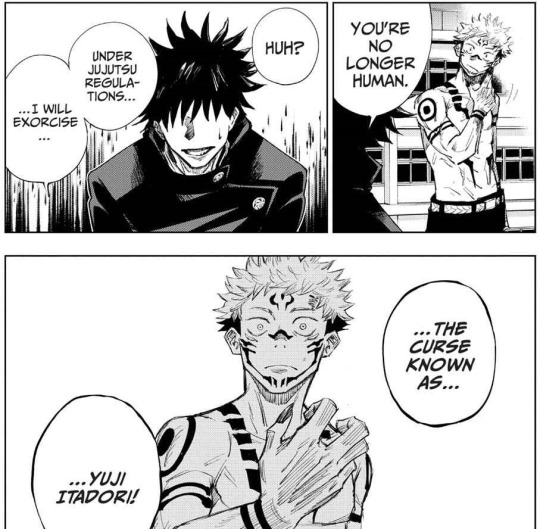
Yuji may be Megumi's target, but remember that Kegare spreads through touch. Sukuna coming into contact with Yuji has made them both unclean. In other words, Sukuna has been informed that in this life, 1,000 years later, where he has yet to do any harm (Those comments about the women, children, and massacre are still sus, but they could've been about the Merger.), he will be attacked by sorcerers no matter what. It's not unreasonable for him to then attack them on sight.
But even when he does that, most of them survive until Shinjuku. During the culling games, Sukuna kills only 2 sorcerers—Ryu and Yorozu. Ryu is given a chance to walk away, but he doesn't. Uro flees and is spared. Yorozu is the sole person Sukuna seeks out to kill and that’s just for his Gojo plans.
And in that month Sukuna has before the showdown with Gojo? Nothing happens. He kills no one and just lounges around. Eating his own corpse is the only cannibalism. He absolutely could have eaten Tsumiki’s body to further crush Megumi’s soul, but he doesn’t.
Then when it comes to the actual showdown, Sukuna kills 3 sorcerers total. It's also very telling that after Sukuna is dead...no one blames him for what happened. They blame Kenjaku, hell even Gojo, but Sukuna isn't mentioned once. Higuruma is convinced that Sukuna was playing around. Kusakabe agrees that Sukuna’s manner of play isn't what they’re super worried about, it's Kenjaku.

The worst thing Sukuna does is Shibuya and that too has nuance to it. The twins aren't killed for fun. Sukuna punishes them for making demands of him. The citizens of Shibuya? Collateral from dealing with Jogo and Mahoraga. (He only really kills Haruta for the sake of it. And let's be real, he deserved that.)
And though the Shibuya civilian deaths are an objectively bad thing Sukuna has done, the fact they are not intentional gives credence to the idea that Sukuna didn't really target them in the past either. This suggests that the "murders" Sukuna did in the Heian were likely retaliation against people challenging him or trying to subjugate him. In other words, self defense.
And if he did wipe out a village, it was probably collateral. But that's kind of the thing. Did Sukuna even kill innocents by accident? The only confirmed kills of the Heian are those of the Subjugation and Military Squads. You know, people who may have attacked him for simply being "unclean".
Who am I kidding he absolutely was attacked for being “unclean”. This is how Angel talks about Sukuna and the incarnated.

She doesn’t care about saving the lives of innocents, all that matters to her are things that she deems evil are purged. Sukuna to Angel is ontologically evil and doesn’t deserve to exist. She targets him more than other incarnated players while ignoring Kenjaku who is responsible for this mess in the first place. She also quite literally did something she deemed wrong and evil so she could follow him into the future and make sure he died. (Move over Gojo Satoru we've got a new minority hunter.)
But it’s not like her attitude is new. Jujutsu Society is notorious for trying to kill things they deem "bad" such as Yuji and Yuta. The striking thing about the wanted executions of these literal children is that the higher ups giving the command make other sorcerers do it for them. Going back to the ideas of Kegare—spilling blood and touching corpses makes one impure so the outcasts are to deal with it. This is the logic driving their decision to coerce Yuta into a binding vow to kill Yuji.

("No matter how many cursed spirits you kill, it's proof of nothing!" <Please take note of how Yuta's good deeds do nothing to earn the higher ups' favor because he's seen as inherently evil.)
Yuta is essentially scapegoated through this manipulation and Yuji initially treats him like an enemy. In the same way characters like Kusakabe blame Gojo for refusing to execute Yuji. Despite the higher ups being responsible for the system functioning this way, the people they’re manipulating bear the brunt of responsibility to other characters.
Who's to say Sukuna isn't also a victim of this scapegoating? His power is comparable to a natural disaster. It would be very easy to blame one on him. After all, the higher ups of the Heian, the Fujiwaras, did exactly that to Uro.

Uro’s situation is much worse than Yuta’s however. She is a military slave. This distinction of military slave is important because unlike domestic slaves, they were allowed to rise through the ranks and be given awards despite their status.
And since Uro is a Sukuna parallel, there is a pretty good chance he was a slave at some point during the Heian.
Slavery in the Heian
A little detail I left out when discussing famine in the Heian. The asymmetrical wealth distribution was so severe during this time that commoners would sell themselves into slavery in hopes of not starving to death.
An example from the Kamakura Era (after the Heian):
"As the article shows, during the three years of the Kangi famine (1229-1232) and several recovery years following, various common people sold themselves, their relatives, and their retainers into slavery in exchange for sustenance. Not only would an amount be given to the seller, but also presumably whoever now owned the sold individual would be responsible for feeding and providing shelter for that individual. In this way, the common populations of Japan created a strategy for survival. There was no certainty that a new owner would fulfill this obligation, but the promise of reprieve from daily struggles was impetus enough for the sale."
Another example from the same era:
"A didactic tale from 1283 tells the story of a small family consisting of a mother and son, who after experiencing severe famine, came to the realization they would soon starve to death. In the hope of saving his mother, the young boy offers to sell himself into bondage, and although the mother disagrees, he goes ahead with the plan."
Yes this is as bad as it sounds, but there is one thing I would like to get out of the way—this slave system did not function anything like the chattel slavery during colonialism. Strangely enough, these slaves had some rights they could fight their owners in court over. They could pay off debts and be set free. They were allowed to be married and have children with those outside of their class. They were not kept in cages or in chains like animals. (Silver linings! /s)
The term used for these slaves was 奴婢 (Nuhi) which roughly translates to “bonded person”. This is more in the contractual sense rather than the physical sense since most were slaves by contract or debt.
This kind of sounds like something binding vows could do, right? Well binding vows share no kanji with Nuhi using 縛り(Shibari) instead. However, Sukuna introduces the concept of binding vows with chains and a handshake.

Sukuna was also born unwanted to a starving mother during a time when starving people sold themselves or their relatives into slavery to survive. This can mean a lot of things for his upbringing and none of them are pleasant.
Here is a summary of what jobs Nuhi did:
"As stated previously, wealthy households frequently obtained slaves and assigned them to various domestic tasks. However, sources further illuminate trafficking of women into the sex trade of Kamakura Japan."
If you noticed, Sukuna's Cursed Technique is perfect for this. He can chop up veggies, butcher fish, till farmland, slash and burn farmland, light fires, and every other non-violent thing a knife and fire can be used for. If he wasn't exploited for exorcising curses, he absolutely would've been exploited for domestic tasks.
And to get to much more depressing line of work Sukuna could've been subjected to as a child, I'd like to discuss why someone as masculine as him would be associated with women's work in the first place.
The Treatment of Women in Ancient Japan
"In Japan prior to the Heian and Kamakura periods, women played prominent roles in religious activities as miko, which was akin to a female medium or female shaman...Since miko functioned as a sacred and integral part in religious communities, issues of impurity did not appear to be an issue. Instead, it was Buddhist ideas that linked the female form to impurity."
With the introduction of Buddhism, women began to be seen as innately impure due to the blood and fluids associated with childbirth and mensuration.
"In the Heian period, Buddhist temples such as such as Enryakuji and Tōdaiji, began barring women from entering the premises due to their defiled nature."
"prominent Buddhist discourse painted women as innately defiled and therefore unable to achieve enlightenment in their own female bodies."
"To be born as an innately defiled female was considered a karmic punishment for past actions."
Though not ostracized as much as outcasts, women were seen as innately unclean in a similar vein to Sukuna. Women were expelled from religious institutions but not the courts, while outcasts were tolerated by religious institutions and barred from the courts. (The courts and temples operated independently of each other, which is why it was possible for noble women to hold power despite being designated as unclean.)
A few months ago I made a joke about this panel:

"Sukuna’s two options were helping Uraume transition or becoming a girl himself."
This is still mostly a joke, but I do think Sukuna identifies more with women than with men. Not that Sukuna is a girl, but that he relates to them and their struggles better. (Keep in mind he does wear a women's yukata and a men's obi at the same time as Yujikuna.)
It's important to note is that this mystery woman here wears the clothes of a Miko or Shrine Maiden/Priestess—the main group of women that was displaced and persecuted because of the new religious doctrine. And like every other group without a proper social safety net, selling themselves into slavery became a survival strategy. They did have other options of course. In the case of Asobi, the Priestess that used to serve the courts, turned to entertainment and sex work after their exclusion.
"Either riding in boats or setting up shop on busy routes to the capital and religious sites, Goodwin argues that these performers were part of independent, possibly female-run organizations, which were not stigmatized until the later part of the Kamakura period. However, as Wakita Haruko has examined, at least some women involved in sexual entertainment were female indentured servants, serving as security on a loan issued by their parents."
In this way, the exact identity of the Miko in Sukuna's path may not matter. She might be a representation of those who accepted their exclusion and did their best to survive on society's terms. If the South choice is meant to represent returning to who Sukuna used to be, then it can also mean the types of struggles Mikos faced are his as well.
However, there was a temple that continued to accept women as followers—the Muroji Temple in Nara. Interestingly enough, this temple contains an inner sanctuary devoted to the founder of Shingon Buddhism, the type of Buddhism Tengen brought over. The mountain this temple is located on is also associated with a dragon spirit. Since there is historical precedent of at least one temple accepting a group of people seen as innately impure, a place like this may have also been a sanctuary for Sukuna.
With the information we have, it's not really possible to know exactly what awful thing happened to Sukuna. The most important takeaway from this is that the suffering he experienced was systemic. He didn't get unlucky with a few ignorant and bad people. This was the direct result of the Heian class system dehumanizing people. In other words, his choices were severely limited.
Sukuna's Other Choice
Going North with Uraume appears to be very similar what he did back in the Heian—taking in an abandoned child and looking after them. What makes this choice slightly different this time around is that the class system that oppressed him no longer exists in the modern era. Yes, he’ll absolutely face discrimination for being deformed, but the complete denial of his humanity at every turn for his appearance is gone. He won’t be treated as untouchable and inherently evil. Legally speaking, he has drastically more rights. Violence won’t be his only option moving up in the world.
I will always loathe that Sukuna had to die to obtain this. And that the “reformed” modern Jujutsu Society refuses to acknowledge the systemic failures of their institution. Kusakabe makes it very clear he still believes the immediate extermination of anything deemed “evil” is a valid way to go about things, even if it means the death of a child…as long as he doesn’t have to do it. (Hence him blaming Gojo for it, just like the higher ups.) After the fight, everyone passes blame around, absolves themselves of any wrongdoing, and decides no one is really at fault.
There were people at fault for this. There are institutions at fault for this. But their failure to confront those things directly is probably why Sukuna rejected Yuji’s offer so viciously. Instead of trying to understand Sukuna on his own terms, Yuji showed him the value of a simple life he was never allowed to have, then told him to die or go back into the cage.

Yuji offered Sukuna pity but no autonomy, which is exactly the way Hinin were treated by the religious institutions of old.
"However, Hosokawa argues that even in veneration of hinin as representations of Manjusri, Buddhist monks continue to discriminate against this outcast group and further perpetuate their low position in society. Hosokawa explains that although activity involved in charitable works towards hinin, Eison cared little about the salvation of hinin because he saw outcasts as divine only within the context of the ritual of assembly. Therefore, all charitable works directed at hinin were merely ceremonial. Hosokawa advocates the view that Eison believed hinin lacked ‘nature,’ meaning they were unable to study or practice Buddhism. Essentially, without nature, they had no ability to escape the cycle of re-birth through the study of Buddhism."
Sukuna even thinks of modern sorcerers like the ones of old. Why would he ever want to return to that?

His goals are simple; eat, play, and pass time until his dies. That’s not really evil now is it? But the people attacking him don’t know that. None of them ever stopped to asked because they assume him existing freely will bring evil.
But what does Sukuna do when he’s given a month-long truce a body he completely controls? He does what every minority group does when they are no longer being actively oppresed—he rests. He doesn’t go around killing or tormenting for fun. With his newfound freedom he secludes himself and lounges.
The fight in Shinjuku is essentially a group of well-meaning people from a corrupt institution beating an outcast that was ostracized by it into submission. Albeit for very good reasons.
Why did this fight change his mind?
If Sukuna is basically reliving past trauma via the Shinjuku fight, why did he decide this group of sorcerers was worth listening to? The simple answer of course is he lost to them. Sukuna believes the strong impose their will and the weak follow suit.

I don’t think that’s quite right. Sukuna used to be weak too. He was a child once. He used to controlled by others stronger than him. By his own logic he should’ve stayed like that, but he trained to get stronger and eventually rebelled.
Since Sukuna is a known liar and hides his feelings under several layers of repression, I’m inclined to believe this statement is also smokescreen. And after reading the Uraume Epilogue I am certain of this. But for now let’s revisit the Shinjuku fight, starting from the battle that made me realize Sukuna is indeed a pathetic sopping wet cat underneath it all—Sukuna vs Gojo.
Sukuna vs Gojo
Something fans picked up on during this fight was how Gojo dogwalked Sukuna when it came to Hand to Hand (H2H) combat. During their fight, Sukuna fails to land a single punch on Gojo’s face. It takes Yuta possessing Gojo’s body and fumbling around in it for Sukuna to finally punch that face. But it’s not just Gojo he sucks at with H2H combat. It’s everyone. Here is a compilation of Sukuna getting hit in the head or face.

This seems to conflict with Sukuna’s ability to learn anything visually. He sees someone do something and he can copy it immediately. This contradiction can be explained by him being Hinin.
Sukuna was considered an untouchable. Educated people were of a higher class and believed unclean things like him were to be avoided at all costs. This means that whatever education Sukuna obtained for himself was always at a distance. Aka watch and copy. And since H2H is mostly taught through body to body contact, Sukuna wasn’t allowed a proper sparing partner outside of the attempts to kill him.
In Part 2, I go over Sukuna’s fraud allegations for his copying of Gojo in particular. This is what lead me to realize that Sukuna spent 6 months plotting to kill a guy he met for 10 seconds. This insane level of pre-planning is also shaped by him being Hinin.
We know for a fact that Sukuna hunts deer/elk and that it’s safe to assume he driven to this because of his Hinin status. If you know anything about hunting, it’s that most of it is playing psychological mind games with creatures that are somehow complete geniuses despite having 2 brain cells. You don’t chase after a deer with a gun, you become obsessed with them. You study every little habit of theirs; when they hunger, what they eat, and where they defecate. Using this information, you set up the bait and wait in hiding for the perfect opportunity to kill them.
This is pretty much what Sukuna does to Gojo. He’s got a hunter’s obsession with him. In Part 4, I explain how this obsession might actually be unhinged courtship, but I don’t lay out why Gojo of all people seemingly means this much to Sukuna. This too can be explained by him being Hinin.
I’ve said it over and over, Gojo and Sukuna are twin flames. They are the strongest, isolated, dehumanized, exploited, self-taught, and really bad at showing affection. Part of this obsession is driven by Sukuna seeing himself in Gojo. He's being ordered around by others weaker than him in the same way Sukuna used to be.

But take note of this “I owe you a debt.” It’s easy to assume he means payback for punching him in the face. However…Gojo did actually do Sukuna a massive favor. He suspended his execution, even if it was primarily to save Yuji.
As I discussed before, Kegare was infectious. You touch something unclean and you become unclean yourself. By laws of Jujutsu Society and by social stigma around Kegare, Sukuna made Yuji equally as impure as himself. And Gojo went screw that, I’m going to look after you. He gave Yuji direct lessons, made sure all his basic needs were met, and treated him like a human. Behind everyone’s backs he hid the final finger, intending to let Yuji live for the duration of his natural life.

To Sukuna, Gojo is someone who would have taken him in and advocated for his humanity under different circumstances. Gojo is someone Sukuna would’ve loved to have as a teacher. And so he copies him. He learns and improves his own sorcery as if Gojo had intentionally taught him.
Through the Shinjuku fight, his experiences within Yuji, and Megumi’s memories, Sukuna gets a taste of what could’ve been. With Megumi in particular, he also gets to see what it’s like to be raised by someone who actually cares. Though not intentional, this is how Gojo teaches Sukuna love. This is why when Sukuna looks at Gojo, he thinks about love.

Sukuna choosing to go with Uraume is him copying Gojo one last time. After seeing that even if you’re isolated, exploited, and miserable, there’s still fulfillment in using your power to make sure someone else doesn’t go through what you did. It may not remove all that pain, but it makes it easier.
And bringing back Kegare’s opposite Hare (晴れ). The kanji used are in the Appare Da (天晴れだ) when Sukuna tells Gojo, “You cleared my skies.” (The Da at the end of this statement means it was pretty heartfelt too.) With this additional context, I think it can be taken to also mean that Gojo made Sukuna feel like he wasn’t impure.

Sukuna vs Yuji
Yuji and Megumi are the ones who ultimately make Sukuna realize that it's worth pursing guardianship regardless of marital status or blood relation. They are the two of Gojo’s students/children that are directly compared to Uraume.

Yuji who is also the same as Sukuna, fills the role of Gojo when he first chooses to look after Megumi. When he prevents Megumi from being sold by his father. Sukuna has seen both versions of this memory.

Since Sukuna is a twin to Wasuke and they are also the same, JJK 265 is Yuji showing Sukuna an entire alternate universe of the normal life he could've lived if he had been seen as human.

And even if he can’t ever be seen as human or live normally, Megumi tells him it’s ok to be improper and cherish someone anyways.

None of these 3 realize how greatly they’ve affected Sukuna. He barely admits to it even in death. But Sukuna had secretly wanted this from the start. The cracks started showing when he first tried to teach Megumi in his special little tsundere shark way.

There's also something to be said about Uraume making it to adulthood in a time where famine was rampant and parents would sell their children into slavery just to eat. Their cursed technique manifested around the age of 6, just like Megumi. The fact they survived means Sukuna was already doing a pretty good job as their guardian.
Other Things this Changes
I'm also looking at Sukuna's fondness towards Jogo in a whole new light. I thought that Jogo wanting nothing of him was the main reason he was favored. But there's more to it that that. It’s that he regards Sukuna’s life as inherently valuable. Jogo believes in a world where Sukuna has the right to exist as he is and how he wants. No one will try to control him or condemn him for something he had no say in.
He also stands out in his devotion to curses of any background. Mahito basically looks like a human, Choso and his brothers are half human, Sukuna is fully human, and Jogo accepts them all no questions asked. He’s willing to fight for people who exist differently than himself.
There's also that added “wanting to be seen as human” element. Jogo’s world is one where Sukuna would finally be seen as human. It’s the same logic that drove Choso to side with the Disaster Curses. He knew how difficult human society would make the lives of his brothers (both of which have 2 faces like conjoined twins), so he chose to fight for a world where that kind of discrimination no longer existed. (Which is why it's really sad he died and no one mourned him properly.)

And yes we can condemn the mass slaughter of humans as the wrong way to go about this. But the core problem is that Jujutsu Society branded them as taboo and in need of extermination or containment. They were driven into a corner and believed violence was the only way out. The only reason Choso was able to change was other sorcerers giving him a chance despite the hurt he caused. Something Sukuna didn't get outside of the offer to be caged.
Am I being too lenient with Sukuna here?
Absolutely. I am extremely biased.
To me at least, the type of "evil" Sukuna is has a lot nuance. It is very significant that someone as strong as him, who could basically do whatever he wanted (theoretically), took one willing servant in a time where slavery was widely practiced. (If you read the linked document, it's kind of up for debate how legal slavery was at the time.) It's also significant that the Heian crimes he was accused of were limited to cannibalism and murder. He's clearly got rules about his evilness and I really like that about him. I wanted to find the logic driving them and I think I've finally struck gold.
This didn't fit anywhere nicely. But consider the following:
"Earthly sins, on the other hand, were those that only affected individuals or forbidden actions, such as rape or cutting living flesh."
Sukuna's CT cuts living flesh. His very CT was considered impure in the Heian. The flames however, are more aligned with purification. It's just a neat little thing that shows Sukuna's duality imo.
He's also really good at archery. And though this is likely because his flame CT is a bow, he probably got good at it to hunt deer/elk on top of temple duties. (Just another way he enjoys corrupting the divine.)
But please remember, the only reason I've done all of this is because of Umineko's...
Without love, it cannot be seen.
#cactus yaps#Read Challenges to Survival: Responses of Outcasts and Commoners in Early Medieval Japan and Umineko now!#Posts that make it obvious I defended Edelgard on Twitter.#I've been running PR for Zelgius and Sephiran Fire Emblem since forever and they do so much worse than Sukuna.#Same type of trauma though. I will always defend minorities going insane from systemic discrimination.#Kind of wild that Sukuna's possession of Megumi can be read as evil adoption now. Thanks Uraume Epilogue.#When Sukuna looks at Gojo he not only thinks of love but raising a child. What did Gege mean by this?#Vaguely Sukugo but it's certainly a footnote compared to the rest of this.#Anyone versed in Japanese history PLEASE fact check me.#ryomen sukuna#jujutsu kaisen#jjk spoilers#jjk meta
210 notes
·
View notes
Text
Mithrun and brain damage
I'm not sure if anyone is interested in this, but I wanted to make a post talking about why I think that Mithrun has brain damage from a traumatic brain injury instead of him being a representation of other neurological disorders or mental illness. I'm not that involved in the dunmesh fandom so I don't know how common this headcanon is, though I've seen a few people mention it here and there.
This is just my own opinion so if you disagree then that's fine. Some of this is just speculation and I can't say what Kui's intentions were. This post isn't meant to be that serious. I just wanted to talk about it and hopefully inform about how brain damage can affect some people in a way that I hope is interesting and relevant.
This will be kind of long because I like to talk so it will be under the cut. Apologies for the length and how much I ramble. Feel free to give input especially if I got anything wrong or if this is too confusing.
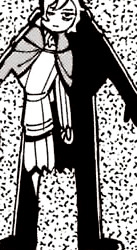
Okay let's go
Traumatic brain injury (TBI) is incredibly complex. The long-term effects of a TBI include a wide array of symptoms. Each injury is different, and some people can completely recover rather quickly while others can become permanently disabled, even for seemingly "minor" injuries. What I'll cover here isn't a definitive representation of the experiences of all those who have long-term effects from TBI, nor do I speak for everyone with brain damage.
Here are some long term symptoms relevant to this post:
Alexithymia (inability to process and name emotions)
Inability to process and name physical perceptions
Mood swings and emotional regulation difficulties
Communication difficulties
Social impairment
Apathy about caring for oneself
Lack of motivation
Alexithymia and inability to process physical perceptions
This one is rather obvious. While Mithrun is shown to feel emotions and have physical sensations (for instance, describing his location when he gets lost in the dungeon as "a cold place"), he is also apathetic to how this affects him. This means that his physical and emotional perceptions are reduced in some way. He says that becoming lord of the dungeon will leave someone "empty", showing he is aware of his dulled emotional state.
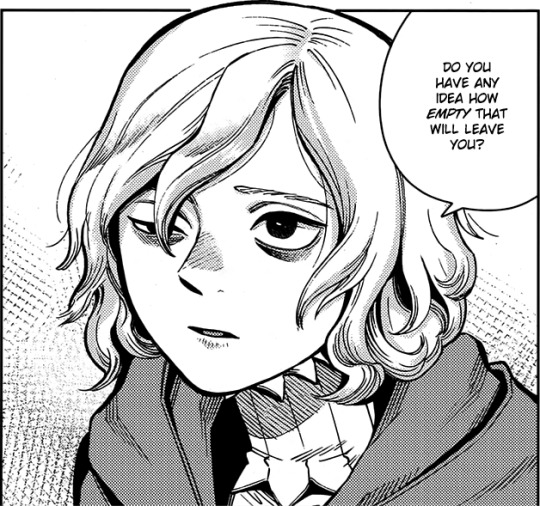
A good example of this is can be seen here in a bonus comic where he doesn't give much of a reaction to burning his mouth on hot food.

(I love these two a lot, by the way. Pattadol is really under appreciated.)
He is also not able to recognize bodily signals, such as hunger or when he is tired. Despite collapsing from exhaustion and not eating for long periods of time, he still insists he is not tired or hungry.
Mood swings
Mood swings in combination with alexithymia can be an especially disorientating experience. Those who struggle to perceive their own emotions can still feel them even if they don't know how to recognize it.
Individuals with brain injuries often experience drastic mood swings, particularly anger. To those around them, they can appear to go from 0 to 100 in an instant.
This is more speculation/headcanon on my part, as the strongest emotion Mithrun has for most of his appearances is anger. However one could interpret this as being unrelated as he is seeking revenge for a traumatic experience.
Communication difficulties and social impairment
Not only can naming personal experiences be incredibly difficult with a brain injury, but other areas of communication are often affected as well.
Mithrun is not able to set boundaries for himself even if someone is doing something he would not actually want them to do, which can leave him in a vulnerable position.


People with brain injuries can sometimes have a paradoxical experience when it comes to communicating with others. They can go from being very quiet to speaking at length about one topic, seemingly without regard for the importance of each bit of information. (I see it like Newton's first law of motion. It is hard to start speaking and it can be just as hard to stop.)
I really like this aspect of Mithrun's characterization. Usually, he is very quiet because he has no reason to speak. However, once he starts talking he is shown to be overly specific and goes on for long periods of time. Kabru has to spend multiple days figuring out his story.
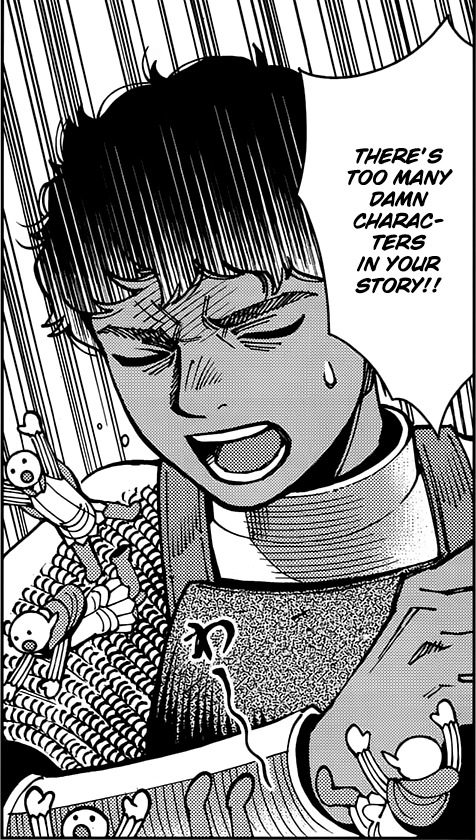
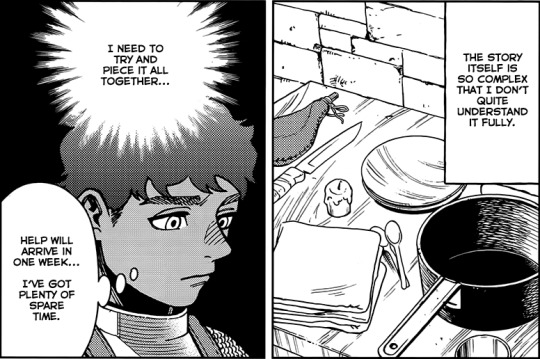
In a side comic, Kabru tells Mithrun he should condense some of the personal details that Kabru finds irrelevant to the topic of the dungeon.
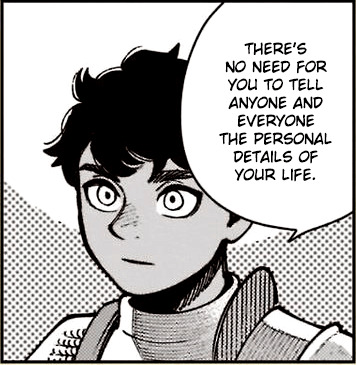
Mithrun shares many details about himself because his desire not to do so is gone. This mirrors the experience of many people who have brain damage to overshare and not understand how their words will come across to others. Sometimes they say or do things that are insensitive or inappropriate for the situation.
Caring for oneself and motivation
In the dungeon, Mithrun becomes reliant on others for self care. He also seems especially incapable of motivating himself to take care of his body when he is particularly focused on his goals.
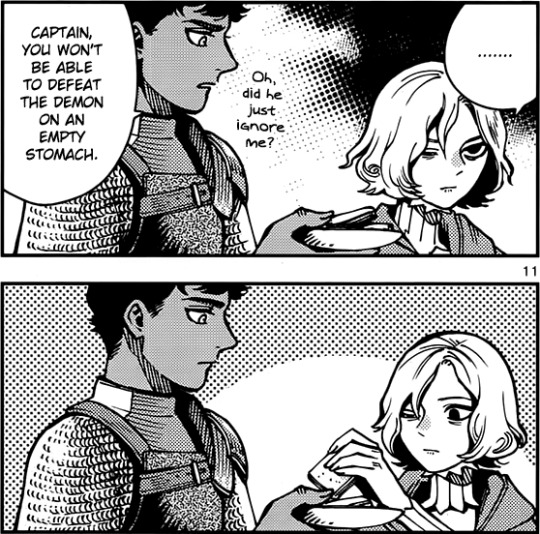
In these panels, thus far he had been fairly receptive of Kabru trying to take care of him. However, he could sense that the demon was close and was too focused on that to care to eat.
Refusal of care and treatment is often an effect of traumatic brain injury. This can be for seemingly no reason, even if the person knows that this will help them. Sometimes people will lie about receiving treatment or doing things to take care of themselves, either so they can avoid it or avoid having someone take care of them.

He knows that eating regularly and not pushing himself too much will help him - he's been told multiple times on-screen - but he still has to be continuously told by others to give him that motivation to take care of himself. He's very apathetic to his physical state, even if it seems his only desire is for revenge and he should be doing anything he can to achieve that.
Other things of note
I wasn't sure where to put this, but while Mithrun's sense of direction is speculated by Kabru to be left over from his time as lord of an ever-changing, confusing dungeon, having poor sense of direction in the way he does could also be indicative of brain injury as well.
While the dungeon is confusing and illogical, he is known to have a poor sense of direction and to get frequently lost by those around him, even trying to exit an entrance he just came through. He is shown to be very intelligent, but memory is greatly impacted by brain injuries which affects a person's sense of direction and location.
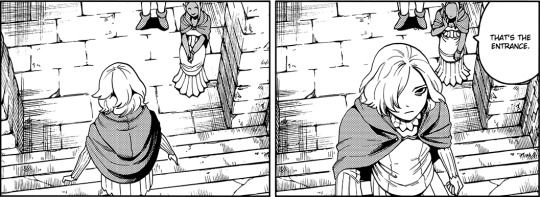
Something that really stands out to me about Mithrun is how much the things that help him are particularly helpful to those with brain damage. He is physically capable of performing tasks, but he needs an outside source to remind him and get him started. He relies entirely on routine, and when that regularity is taken away he shows extreme difficulty taking care of himself.
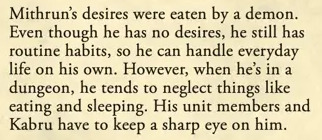
Sometimes, the care that some people need is simply someone else to encourage them or to tell them when to do things. The care that he needs is pretty consistent with a person with a brain injury who does not need a full time caretaker and would prefer to have some independence.
Also, healing magic is specified to not work with brain injury unless the person is killed and revived. Mithrun had not been revived after his injuries, so it is entirely possible for him to have sustained a TBI. I don't think this matters that much because one is still allowed to have headcanons even if there is a magical explanation or isn't really possible in canon, but I thought it was an interesting detail.

In conclusion
Because of all this I don't believe that his lack of self care is due solely to mental illness. While mental illnesses like depression or PTSD can cause a decline in self care, the reasons why the affected individual is avoidant of these tasks differs. These disorders can also cause cognitive difficulties and emotional regulation issues, but not to the same extent or in the same way that brain damage would. I think that he does have both depression and PTSD (both are common after a TBI) but those are not his only disabilities.
And on a personal note, I just think that having a character with brain damage is really cool. Most of the time I've seen it the characters are not given very much respect and they are treated as comic relief and a joke. Regardless of whether you agree with this post or not, it is still nice to see a character with a disability like this.
Thank you if you read all of this. I hope it was easy to understand and I did not ramble too much. I don't have anything else to say but I've been wanting to write this out for a while.
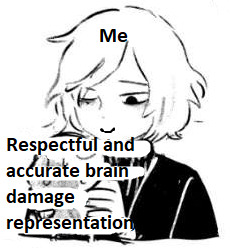
Okay bye
2K notes
·
View notes
Text

⌖ What Is Non-Harmful Transitioning?
[PT :: What is non-harmful transitioning?]
As the term Desirdae has become more popular, a thing I have noticed is people not understanding what "non-harmful transitioning" means. Which is quite fair! It's a very, very vague term that can be used in a multitude of ways. So, in order to curb this slightly, I feel it necessary to elaborate on what, to me at least, non-harmful transitioning entails. If the original coiner, @ghosting-plural-userboxes or @desirdae-archive would like to add anything I would love that! Ty for making this term btw, it's been genuinely so helpful <3
───
⌖ What is harmful transitioning?
[PT :: What is harmful transitioning]
I think in order to get into what non-harmful transitioning is, we should first get into what qualifies as harmful transitioning. So, to me, harmful transitioning is as follows ::
Transitioning by using methods of self harm, such as cutting, burning, bleaching ones skin, etc.
Transitioning by harming others, whether physically, emotionally, or spiritually // metaphysically.
Transitioning by putting yourself in traumatic situations, such as putting oneself in a situation to be groomed, assaulted, physically or emotionally harmed, etc.
Transitioning to have a disorder // disability one does not have, such as harming oneself in order to acquire a physical disability or enacting stereotypical behaviors to "act" as if they have a certain mental illness or disability.
Transitioning in a way that harms minorities of all kinds. Such as using blackface, yellowface, asianfishing, etc in order to "transition" towards different POC identities.
Transitioning to hateful and bigoted ideologiess that harm others.
Simply put, transitioning in a way that actively harms yourself or others is harmful transitioning.
───
⌖ So, what is non-harmful transitioning?
[PT :: So, what is non-harmful transitioning?]
Having gotten some basics of what counts as harmful transitioning out of the way, let's get onto examples of non-harmful transitioning!
Dyeing ones hair as a form of transition.
Partaking in more foods of a specific culture in order to feel more comfortable, while acknowledging one is not part of that culture (this enters a grey area with headmates, as not everything is black and white)
Accepting ones disabled traits, that they already have, and learning that no matter how they experience it, it is enough.
Learning more about cultures in order to feel more comfortable with yourself, while still acknowledging you are not a part of that culture. (Again, gets muddy when it comes to headmates)
Getting piercings, body modifications, etc done by professionals as a form of transition.
Starting HRT or other forms of medical transitioning.
Getting cosmetic surgeries (nothing that would change the appearance of your own race, of course) done by professionals as a form of transition.
And likely many other ways to do it that aren't harmful! There are really, truly, so many ways to go about this that aren't harmful I promise you. I can think of an infinite number of ways to do this stuff non-harmfully.
───
⌖ What makes Desirdae different from TransID?
[PT :: What makes Desirdae different from TransID?]
Simply the means of which one may transition. Desirdae is firmly anti-harmful transitioning for any reason while TransID is pro all forms of transition, harmful or not. You can see this in terms like transnazi, transrace, transplural, and many transharmful identities that it is often encouraged to transition into these things, despite the harm such things do. Desirdae, on the other hand, actively discourages harmful transitioning. So while things like Desirharmful, Desirskintone, etc do exist it is actively said by the creators that one should not harmfully transition into these terms. I will say, many do not make it clear that for some terms there is no way to non-harmfully transition*. But I chock this up to people being, rightfully, tired of constantly having to explain their experience with this term isn't inherently harmful. But it is still an issue I believe should be fixed when possible. * [PT :: there is no way to non-harmfully transition]
───
I understand the worries many have towards Desirdae. We do not want just another TransID clone to take over and create yet another space full of radqueers who push for things like legalization of non-consensual relationships or what have you. That is a fair worry to have, and it was a worry I initially had as well. But in exploring these terms and the community that they have fostered, I have found that this is quite the opposite. It is a community based purely on consent, recovery, and a safe space for people to speak on their issues where as radqueer and transID often push anti-recovery and anti-consent rhetoric. This is the key difference between these two terms, I believe. One feeds into harmful behaviors and seemingly pushes people to the worst versions of themselves while the other is more of a "hey, I understand these feelings, I feel this way too, it's not OK but we can recover together."
If I missed anything, am incorrect about something, or if one has questions I myself am more than happy to answer. While this is not a term and community I created, it is one I am happy to be a part of and want to grow into something helpful.
Thank you for reading, I hope you all have a lovely day. Remember to be kind, anger towards fellow mentally ill queers does nothing but push the agenda of the oppressors <3

174 notes
·
View notes
Text
Do people not remember that period on Tumblr where neurodivergent people completely threw physically disabled people under the bus to further their movement? And then they wonder why we want our own space.
Things used in arguments I heard about 10 yrs ago:
- "you wouldn't say/do that to someone in a wheelchair"
- "we are literally physically disabled too bc our brain is an organ!!!"
- "physically disabled people get everything look they have special parking spaces and ramps!"
- "when you go to the doctor for physical illness they immediately give you all the medicine and work hard to find a cure like Dr. House, but when I go to the doctor they throw me out the window" (stuff along those lines at least)
Y'all kicked us out, ignored us, made your own lil club with its own terms, turned us into jokes and strawmen, and abandoned people who are both physically and mentally disabled.
We wanted solidarity and you all didn't.
But how dare we make our own community so our voices can be heard, god forbid we discuss issues important to physically disabled people in this community without mentioning neurodivergents. And when we get even a little pissed off? How dare we.
And it's happening again. I've seen the same rhetoric repeated. No one is saying that mentally disabled people have no issues or don't face ableism at all. Stop bringing up your issues on our posts, it derails it and clogs up the notes.
We had to separate ourselves because you all kicked us out first so that neurotypical people would accept you. You didn't want to be associated with the gross ugly cripples.
Cripplepunk community is not the same as disabled community. It's under the same umbrella, not a replacement. Stop taking over our spaces and stop posting shit in our tags.
#cripplepunk#cripple#cripple punk#chronic disability#chronic pain#physical disability#spoonie#disability#ive seen a ton of young people posting that stuff and then everyone else rbs it without a second thought#and young people in my notes who dont know the history#pd people feel free to add your own examples
1K notes
·
View notes
Text
see more and more “entire life told/thought i high function but actually am just very high support need” (autism context) and get more and more annoy at that
everytime see everytime click into page and everytime realize by “very high support” (yes see multiple include the “very”) they mean comorbid anxiety depression cptsd trouble make friends because people think “weird” bullied lose speech need remind shower need remind things (but able do and if no remind after a while will do) trouble school trouble job etc am forget.
and all that hard struggle yes no deny. deserve all the help and am not say it easy.
but it not “very high support need.” not even “high support need.” have higher need than what nondisabled neurotypical society expect you to is not “high support need.” yes, know many people do this because want validate self and past and trauma. but. not need be high support to be valid or to receive support. not need be high support for past trauma & past neglect & past not get support to be valid.
and. it water down definition of “high support need.” kick actual high support need out. us who extra vulnerable because need physical help most or all bADLs. need constant 24/7 supervision to be alive to not accidental harm self or die. need medical services for stuff people (include these people) take for granted, like just be able communicate, walk (yes many high support need autistic people struggle with that even without specific physical disability dx), feeding, etc. no awareness of self or other people or surroundings or danger. need 24/7 behavioral support. experience explosive emotions that even terrify self self no understand and cannot control behavior so destructive. many very high support, if not get support they literally die. not exaggerate. that how high of support they need.
(and even debate about whether should write this list. because. unless you high support yourself or experience these same amount yourself or close to someone who is or give care for them, very high chance you not get degree of symptom am talk about. plenty autistic struggle emotional regulation, for example. some struggle with severe intense lose control explosive behavior, include some level 1s. but unless you experience it self or read lot lot lot lot about & by people who do, found that average person include average autism community person not know what am mean by explosive emotion.)
it not “gatekeeping” or “call fake.” it me get frustrate at people misuse medical term that used describe extremely vulnerable population, who rely on other people to keep basic alive, many us have trouble or have limited language communication or have none at all, we need keep medical term describe us because many us cannot explain cannot list you our support need, either because long or private or make us feel awful or literal no communication/intellectual ability.
by validate self you harming us. “well it just one person identify themself not affect you [eye roll].” no, not just one person. but even if just one person, people around them see, and think, oh, that high support need, that very high support need, am educated. and that spread. and actual high support need people like am describe are ignored people don’t think they exist.
please. talk about own experience. no matter “there people more struggle than me.” am not say cannot. am not say “look at these actual struggles yours mild shut up.” it autism spectrum, there spectrum of experience. there more than “no support need” vs “high support need.” there things in middle. even low support need—that just mean low compare to other autistics. not “your support need your trauma not important.”
but please. remember us. leave our terms alone.
1K notes
·
View notes
Text
Most people tend to point out how badass Alhaitham is here (true). But what I like and appreciate a lot about this scene is how it also shows that Alhaitham cares enough for the general public's safety (including the Ayn Al-Ahmar members he'd agreed to fight with just moments before) that he rushed in to disable Mizri's corrupted Akasha terminal to stop his rampage. Alhaitham didn't actually need to do so either (he's not the Matra; public security isn't part of his job as the Scribe) since Mizri was attacking his own members. But Alhaitham still crossed that distance just to protect the other members of the faction once he'd realised what was happening, and he didn't even draw his swords out against Mizri. **Edit: I would like to also point out how there's a note of concern and urgency in Alhaitham's voice that you can hear clearly both in the JP dub here and in the original CN voice. It can be argued, of course, that he only did this knowing that Mizri had the Divine Knowledge Capsule and because he'd wanted to steal it. Still, Alhaitham could've kept his distance as Mizri continued lashing out at his men, and during the chaos and confusion, he could've easily filched the Capsule too before letting the Matra deal with the group's in-fighting while he slipped away with it. But he chose to jump right into the fray instead and risk injury to himself by going against a berserk Mizri.... though, I suppose Alhaitham had probably already decided that risk is extremely low and reasons that "I'm a very good fighter and I've a Vision, so I was never in any actual danger" or something along those lines. Because he's just annoying like that lmfao. This also makes that one iconic, quotable quote of his "I'm merely a feeble scholar" all the more hilarious.... What a lying liar LOL...
Still, I'm willing to accept his (modest lol) rationale, that in terms of sheer brute strength and perhaps without any help from his Vision, Alhaitham isn't as physically strong as the most jacked Eremites—he did preface the above line with "Compared to the mercenaries...", after all lol. He's simply a very efficient fighter who excels at using speed and agility to his advantage.
#genshin impact#alhaitham#tldr keysmashing with feels#i should be working on my wip but#instead i'm rambling stray thoughts to get out of writer's block#of course i also think alhaitham was intentionally being disingenuous with that line#bc he just...like messing with ppl sometimes l o l#i'm sorry this sideblog is turning into an alhaitham appreciation rambling space#but he's always been the One True Blorbo so lol
131 notes
·
View notes
Text

i never really post my own art on here but.. been following @beluvbug's applejack au (princess of gender dysphoria) and have seen people talk about wanting to make their own aus and how all of them could to go to group therapy.
and seeing him mention jokingly in a tag on an ask that they need a rarity one now may have led me to start thinking of how i'd interpret my favorite pony in a similar setting.
so here is a really messy sketch just to get some ideas down. rarity in this would have just hit a very long patch of burnout.. as well as coming to terms the new limits of her body due to a disability that has started to impact how she's able to take care of herself. (i imagine she's an ambulatory wheelchair user but does use it most days). if i end up doing a story or anything i think it'd follow her as she learns how to continue on within her new limits (both physically and mentally) and also i think she would get hit with the gender beam (because it is self indulgent and transmasc rarity who still loves feminine things is what i believe in my heart)
#i gave her a crystal horn and hooves btw cause i love it when horns and hooves are different colors and i love crystals for rarity#the wheelchair colors are just a placeholder..#i think she'd cut her hair just for maintaining it better and the gender moments will start hitting#mlp#diamond in the rough rarity#<- placeholder tag incase i make more
235 notes
·
View notes
Text
Thoughts on Echo as amputee/disability representation
First and foremost, I am not disabled or an amputee and I don’t claim to speak for those communities (and if I was I couldn't speak for everyone). What little I do know mostly comes from this youtube channel (@oakwyrm), this post, and other research I’ve done for my writing (and like one amputee I kinda knew in passing). By all means correct me and add to the conversation, I just have some thoughts I want to share because I haven’t really seen this discussed anywhere
Overview
So Echo is interesting. He is a triple amputee which is pretty rare in media. His disabilities come from extremely traumatic circumstances: injured in a near-death experience, imprisoned and dehumanized as an experiment with no autonomy over what happened to his body.
There are a few moments in the shows where Echo is treated… questionably. Like this bit where Rex uses him as an example of the Separatists' evils to convince the locals to fight back:
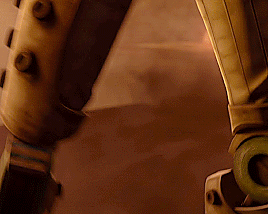
To be fair, yeah Echo’s treatment does prove that the Techno Union is not neutral like they claim. The modifications that everyone is gasping in horror at here obviously weren’t made with comfort and accessibility in mind, nor with Echo’s consent. But you still just want to be sure that “They took away his freedom, his humanity, they tried to turn him into a machine” is about using him as a living computer, not the fact that he is missing limbs.
The Batch is also pretty insensitive toward him and his trauma imo, which is weird considering they've supposedly also faced discrimination for their mutations
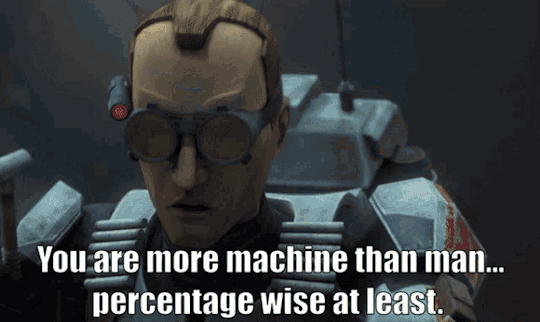
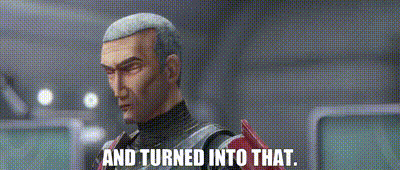
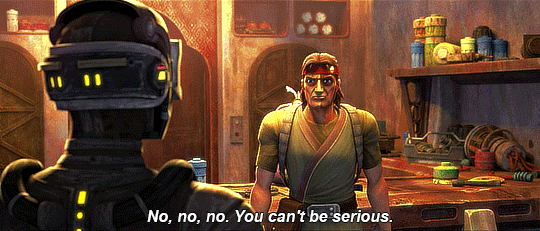
Disabled people do have to deal with stuff like this in this day and age so I guess it can speak to those experiences. I think especially him being mistaken as a droid (and Hunter going along with it (bruh)) might resonate with some people.
Aside from that stuff, Echo isn't really treated any differently as a character/person which is really good (as low of a bar as that is).
We get this moment in CW where Echo contemplates that yeah things are gonna be different now
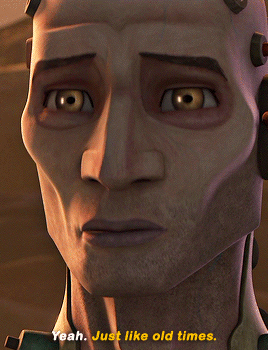
While also (imo at least) showing that he is still the same person regardless, evidenced by the fact that he just echoed Rex :,) I also think it's significant that he joins the Bad Batch on his own terms and we're given a really emotional scene to specifically show that he's not just like 'lumped in with the other misfits' but that it is his choice to go where he feels his place is.
A lot of people, myself included, are disappointed that TBB didn't have more time to explore Echo's PTSD, but I think the one panic attack scene we did get is really good. Even thought it's minor it at least is an appropriate reaction from a guy who was medically tortured (which is more than I've come to expect from Star Wars shows lol)
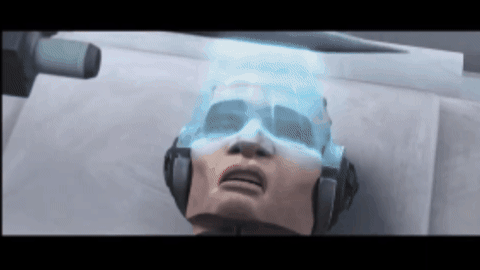
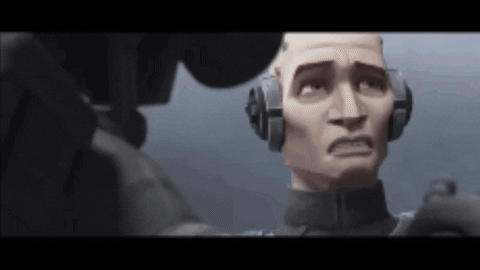
And it's really sweet to see Omega showing Echo some empathy and consideration.
It would have been nice to see more of his adjustment period, and other side effects like chronic pain and maintenance, but there’s a lot of daily life stuff the show never had time for (i.e. we don’t know if he removed his prosthetics to sleep, but we also never saw him sleep anyway). His disabilities might take on a background role (much like the character himself sadly) but for the most part they aren’t invisible or erased, nor do they define his character and arc.
Physical Appearance
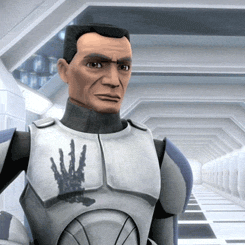
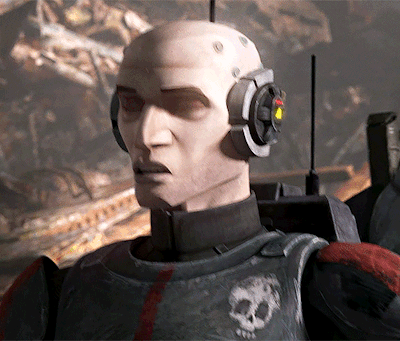
Okay this one is bit dicey, bc on the one hand, yes complaints that Echo’s paleness (most likely caused by burns from the explosion or chemical burns from the cryo-chamber) is whitewashing are totally valid. But I also think you can draw comparisons to real life conditions that affect pigmentation/complexion (like you know burns). So while I understand why a lot of fanart will depict him with his original skin tone and with hair, consider that there are real people who have to live with temporary or permanent changes to their appearance, and the idea of “fixing" him by making him look more like his old self can be problematic.
It's also interesting to note that Echo could act as a reversal of the 'disabled/disfigured = evil' trope. He's pale and bald and wears black and red, which is so often visually associated with villains, but we all know Echo is the bestest boy™
The Headpiece
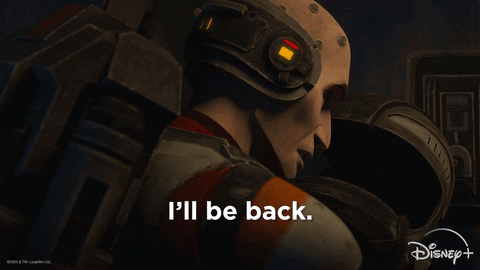
Echo’s headpiece is interesting because within the show we don’t actually ever learn much about it (idk if there is more info in books or whatever bc i don’t have them so?). He didn’t have it in CW so we know it didn’t come from the Techno Union and therefore Echo probably had more choice with it. We don’t know its exact purpose but it’s most likely related to his scomping abilities. When he is hacking with his scomp in CW, before he has his headpiece, it’s clearly very mentally straining:
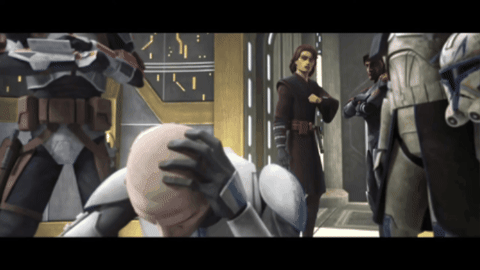
We don’t see him struggling like this in TBB once he does have it (though that could be bc he got more used to it over time). There doesn't seem to be much of an impact when he removes his headpiece in s3 ep14-15, except that he gets stuck in the ports every time he uses his scomp which is not something we’ve seen before:
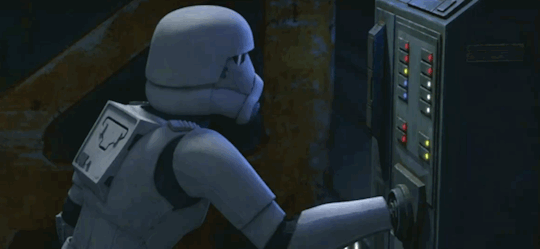
There might not be an exact real-world equivalent, but the headpiece is some kind of accessibility aid. It means that someone specifically designed a device to help him adapt to the changes the Techno Union made, as well as a helmet that integrates it. It’s removable and visually very present, much like a cochlear implant would be. (A lot of people actually headcanon it to act partially as a hearing aid, since it makes sense that Echo’s hearing would have been damaged in the explosion, but there isn't really any indication of this in canon.) The headpiece is never really acknowledged in the show, but I think that's a good thing. It's something he needs/wants and it just exists, completely normalized, and that's pretty cool 👍
Legs
Sigh... So from the very first episode of TBB I was really disappointed that the animation team or whoever completely visually erased Echo’s prosthetic legs (I think we all were, honestly, if fanart is anything to go by). It’s one thing when he’s in armor because he would probably want to protect his prosthetics, but we literally see him in his blacks and there is no indication whatsoever that he lost his legs even though it was not left up for debate at all in CW:
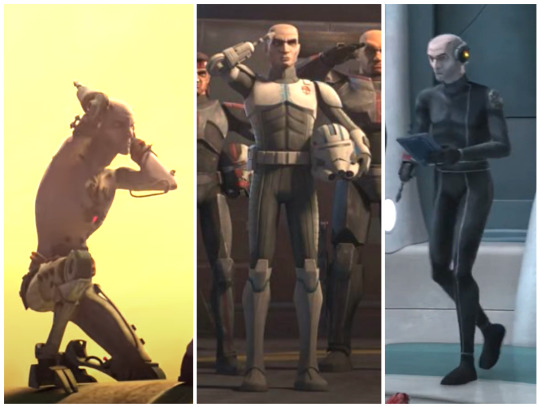
Like ??????!?
This is just really strange to me! Idk what went on behind the scenes with this decision but I don’t really see why it would be that much harder to animate or anything since it’s 3D and they've done it before. We do see some pretty sophisticated cybernetic technology in Star Wars canon that mimics real limbs:
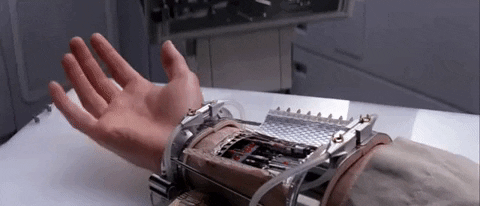
But Luke’s fancy hand is technically 20ish years from now, so Anakin and Maul are more of a representation of what level we could expect here
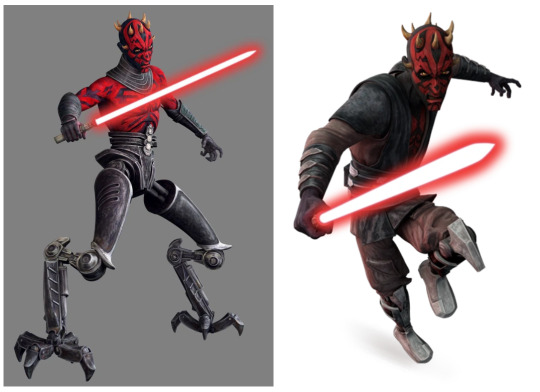
So yeah, for no apparent reason, his leg amputation is effectively, visually and narratively nonexistent. Which is not great 👎
Arm!
The scomp on the other hand (uh lol!) is the complete opposite and I kinda love it!
At first I, like many others, thought it was a bit odd that they didn’t give Echo a prosthetic arm. Losing hands is basically a Star Wars tradition at this point, so robotic arms/hands are well established within the worldbuilding:
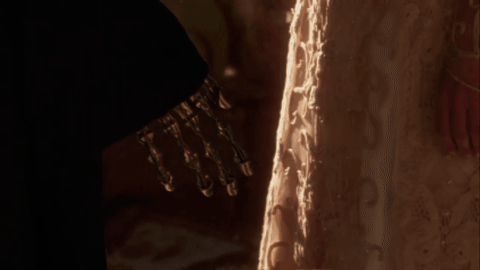
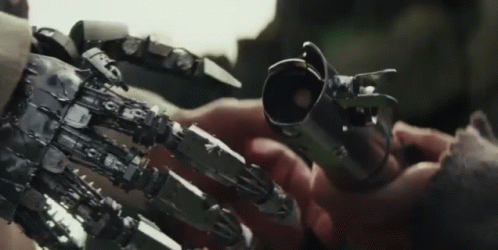
We aren’t necessarily given a canon reason for why Echo doesn't get a cybernetic arm (again unless it's in some lore book I haven’t read, sorry). General fanon explanations I’ve seen are that he either couldn’t because the Techno Union wired the scomp too far into his nervous system, and/or the resources to give him one were deemed too expensive for a clone (what about his legs tho?), or that he chose not to, usually because he thought the scomping was useful.
Regardless, I actually really love this choice (and it's the whole reason I made this post), because here's the thing: There’s a lot of problematic tropes out there that either erase/cure disabilities or compensate them with perks (like how pretty much any blind character is actually not blind by some sort of magic power). With amputees that is done with robotic arms. The character is still an amputee or course, and there is still value in that representation, if this story from Mark Hamill that makes me tear up is anything to go by:
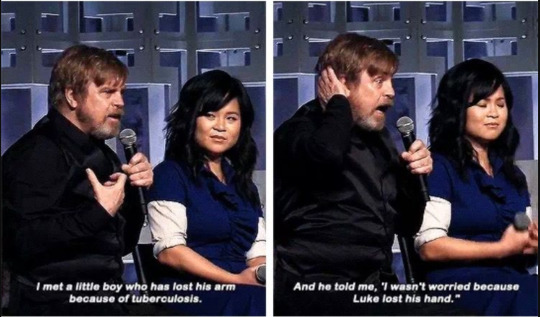
but for the most part these characters function like anyone else, just with a limb that looks a little different. It’s no more than a video game skin, an able-bodied actor with a green screen glove. It “cures” the disability, or it actually makes the character even stronger than usual:
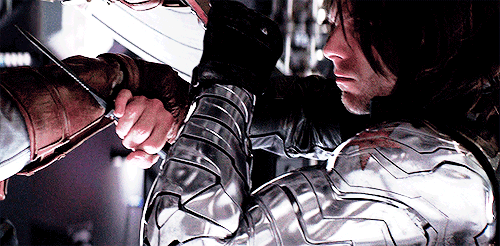
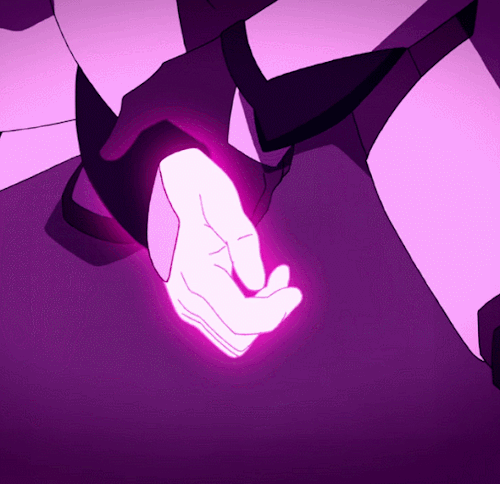
It usually makes sense within the world of the story, but the reason it’s not so great in my opinion is that in the real world we just do not have technology anywhere close to that yet. Prosthetics can more or less replace any mobility from lost legs, but not for all the complexities of a hand (and even if they could the average person wouldn’t be able to afford it).
So
I think it's actually really super cool that Echo’s scomp bypasses the canonically-established amputee erasure and functions much like a stump would irl. He integrates it into his movements and everyday life and it’s (as far as I know) a lot closer to an everyday amputee’s experience.
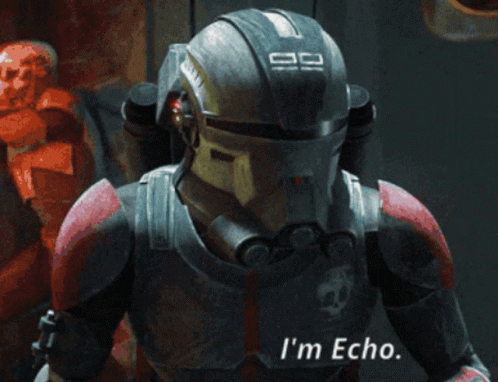
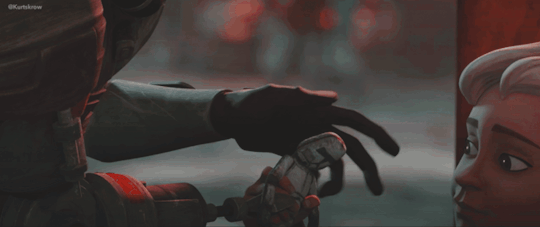
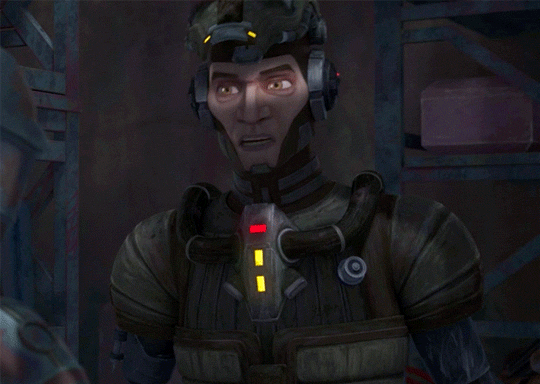
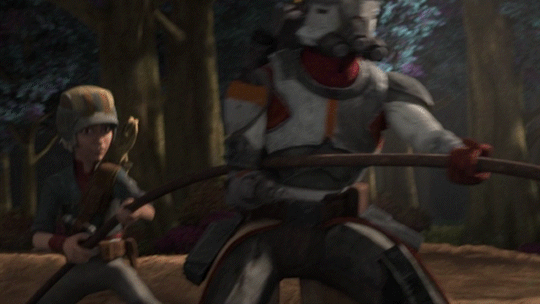
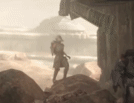
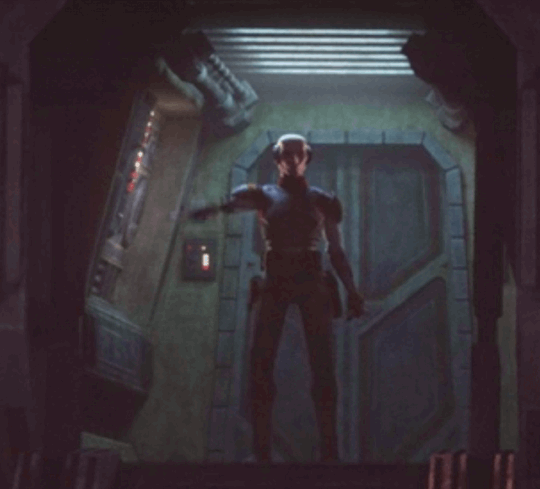
It doesn’t define his character, it doesn’t hold him back, he lives a full life, the other’s don’t treat him any differently, and he’s still a total karking badass
The only additional thing is that he sometimes uses it as a weapon (which given his story, I think it’s cool to see him taking back autonomy in a way, and we only see that like twice)
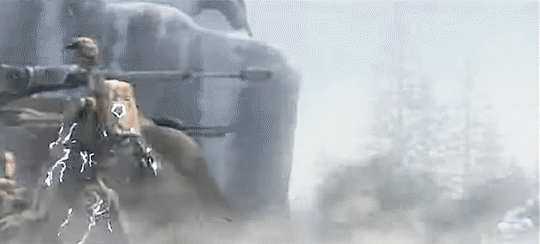
And also the scomping, which could be seen as the 'added/compensating superpower' trope. But narratively it's no different than if he was plugging in with a hacking gadget of some kind (he didn't necessarily "need" to lose his arm for it) and it’s not like Echo is completely defined by this skill. Personally, I think it's well worth the positives of him actually having a visible and realistically impactful amputation.
I see a lot of posts or comments out there that say stuff like “how come Echo doesn’t get a hand?” or fanworks that do give him one and I just think it’s a bit of a shame. If he did get a robotic hand, it just would have disappeared the same way his legs and Anakin’s arm did (aside from that one time he got yoinked by a magnet). When Echo did “get a hand” in the last two episodes there were comments like “yay he finally got a hand! but it doesn’t even work” but I was actually so relieved that it didn’t! Bc for one thing that wouldn’t make any sense, he grabbed it off a droid, it wasn’t designed to implement with his scomp, that would be really complicated. But more importantly because it again refused to erase/cure his disability! It functioned like a real-world cosmetic prosthetic (useless beyond appearance) which is exactly what he needed it for, so that he could blend in better with his disguise.
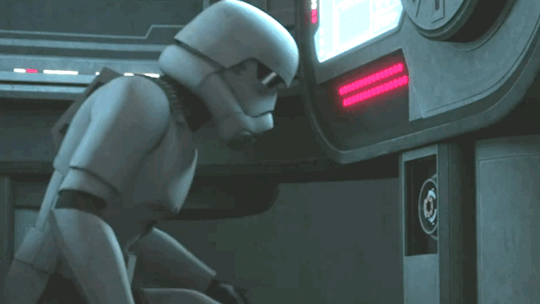
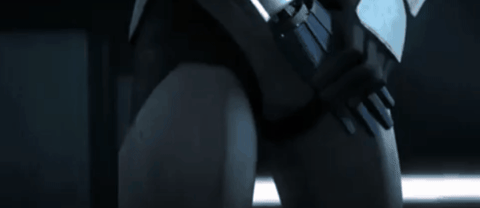
And he continually took it off throughout the episode and ditched it at the end. He only used it for the necessity of a stealth mission, he doesn’t feel the need to visually “fit in” in his daily life.
And, last but very much not least, he made a dad joke and from my intel that is very accurate representation!
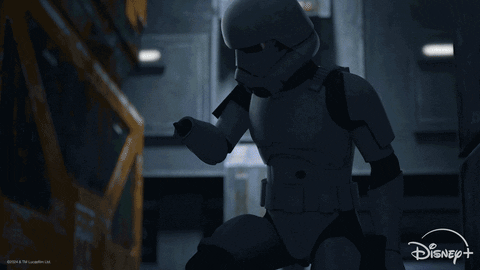
TLDR: Echo’s scomp is actually really cool from an amputee representation perspective, especially within Star Wars, and I think that deserves some appreciation
#man i just love him so much!#this post ended up ten times longer than i was expecting lol#its so strange to me that the same team that completely noped his prosthetic legs also gave us such good arm amputee represention#like whats up with that?#echo's scomp appreciation#also so glad those weird mod arm attachment things from the action figures never happened#representation matters#disabled lives are worth living#disability representation#amputee#disability tropes#robotic limbs#ableism#star wars#clone wars#the bad batch#sw tcw#arc trooper echo#tbb echo#tbb season 3#unwhitewashtbb#long post#accidental essay#analysis#thoughts#imo#rant#character analysis#writing disabled characters#writing
296 notes
·
View notes
Text

For the Benefit of All: Assistive Tech Developed from NASA Tech
What do modern cochlear implants and robotic gloves have in common? They were derived from NASA technology. We’ve made it easier to find and use our patented inventions that could help create products that enhance life for people with disabilities.
October is National Disability Employment Awareness Month, which highlights the contributions of American workers with disabilities – many of whom use assistive technology on the job. Take a look at these assistive technologies that are NASA spinoffs.
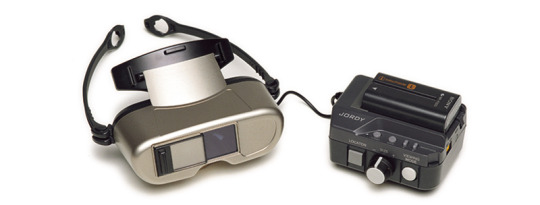
Low-Vision Headsets
The Joint Optical Reflective Display (JORDY) device is a headset that uses NASA image processing and head-mounted display technology to enable people with low vision to read and write. JORDY enhances individuals’ remaining sight by magnifying objects up to 50 times and allowing them to change contrast, brightness, and display modes. JORDY's name was inspired by Geordi La Forge, a blind character from “Star Trek: The Next Generation” whose futuristic visor enabled him to see.

Cochlear Implants
Work that led to the modern cochlear implant was patented by a NASA engineer in the 1970s. Following three failed corrective surgeries, Adam Kissiah combined his NASA electronics know-how with research in the Kennedy Space Center technical library to build his own solution for people with severe-to-profound hearing loss who receive little or no benefit from hearing aids. Several companies now make the devices, which have been implanted in hundreds of thousands of people around the world.

Robotic Gloves
Ironhand, from Swedish company Bioservo Technologies, is the world’s first industrial-strength robotic glove for factory workers and others who perform repetitive manual tasks. It helps prevent stress injuries but has been especially warmly received by workers with preexisting hand injuries and conditions. The glove is based on a suite of patents for the technology developed by NASA and General Motors to build the hands of the Robonaut 2 humanoid robotic astronaut.

Smart Glasses
Neurofeedback technology NASA originally developed to improve pilots’ attention has been the basis for products aimed at helping people manage attention disorders without medication. The devices measure brainwave output to gauge attention levels according to the “engagement index” a NASA engineer created. Then, they show the results to users, helping them learn to voluntarily control their degree of concentration. One such device is a pair of smart glasses from Narbis, whose lenses darken as attention wanes.

Anti-Gravity Treadmills
A NASA scientist who developed ways to use air pressure to simulate gravity for astronauts exercising in space had the idea to apply the concept for the opposite effect on Earth. After licensing his technology, Alter-G Inc. developed its anti-gravity G-Trainer treadmill, which lets users offload some or all of their weight while exercising. The treadmills can help people recover from athletic or brain injuries, and they allow a safe exercise regimen for others with long-term conditions such as arthritis.
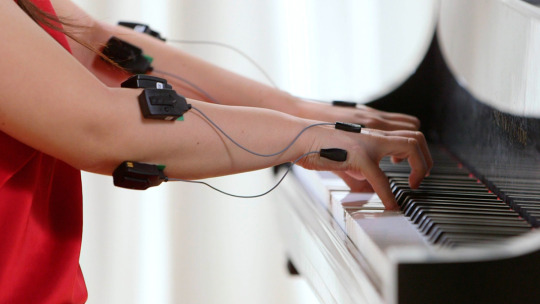
Wireless Muscle Sensors
Some of the most exciting assistive technologies to spin off may be yet to come. Delsys Inc. developed electromyographic technology to help NASA understand the effects of long-term weightlessness on astronauts’ muscles and movements. Electromyography detects and analyzes electrical signals emitted when motor nerves trigger movement. Among the company’s customers are physical therapists developing exercise routines to help patients recover from injuries. But some researchers are using the technology to attempt recoveries that once seemed impossible, such as helping paralyzed patients regain movement, letting laryngectomy patients speak, and outfitting amputees with artificial limbs that work like the real thing.
To further enhance the lives of people with disabilities, NASA has identified a selection of patented technologies created for space missions that could spur the next generation of assistive technology here on Earth.
Want to learn more about assistive technologies already in action? Check out NASA Spinoff to find products and services that wouldn’t exist without space exploration.
Make sure to follow us on Tumblr for your regular dose of space!
#NASA#space#tech#technology#spinoff#robotics#physical therapy#disability#disabled#accessibility#a11y#inventions
840 notes
·
View notes
Text
MERCS AND ANGER
scout: explosive like a firecracker. kinda boring from a distance but a danger in your hands. you really don’t want to be the guy he’s mad at, and probably not like a good friend of the guy either. otherwise the absolute grudge is really funny because he’s so creatively aggressive with how he insults people. and he doesn’t let shit go. it takes him a good long while before he’s ready to drop a feud. however, firecrackers, if you’re fast enough and ballsy enough, can be put out. you’ve maybe got a minute to take back what you say and all will be just fine. he might be annoyed with you for a couple of days, but you can bounce back.
soldier: explosive like a rocket. don’t give him an insult he has to think about. he’s gonna get madder that he had to think about it and he’s gonna come and kick your ass until he’s bored. and he will never get bored. has tried in incremental amounts to not get that mad anymore; nobody has a good time when he’s that mad. also a big shit talker, but the better term is “war decree”, because getting him angry is declaring war on him. and he is very frank with what the plan is when it comes to the attack. can, has tried, and actually has on two occasions involved the team in revenge plans. i don’t know how to quickly disable a rocket; so i would hope you do.
pyro: pyro will take their anger out on the battlefield. that’s when pyro gets weird and nobody wants to be around them at the base because they’re being weird on the battlefield. but at the base they don’t act any different. because normally the team does not anger pyro. sometimes pyro wakes up and is fueled with rage. at anything. at everything. sometimes they get so mad at themselves, and they don’t know why they get so mad. they’re just being themselves, as they were yesterday, and the day before, and the month prior. their imagination can buffer that with making the enemy team seem… squishier. fun to throw around because they just return back to their shape. they enjoy that. that’s really fun.
heavy: here’s the thing; heavy is a good and not messy guy, so heavy will make all efforts to discuss any problem he has with anyone, and does expect vice versa. if you’ve got a problem with him, his door and ears are open. he’s willing to talk about it. however, do not mistake that for weakness. i mean, come on. literally look at him. do you want to push him there if he’s willing to discuss it? really?
demo: demo will give you one (1) opportunity to course correct. after that you’re on his shit list. he’s got a physical list, a couple of pages, front to back, of peoples full government names, a glued on ID picture, and their most current address. not enough names on the list for a journal yet but he’s always willing to add. and getting on his shit list is permanent. you are not to speak to him. you are not to be within his eyesight. and if you are, there’s a problem. and you’ll get one (1) opportunity to course correct before it gets physical.
engineer: engie doesn’t get messy with his anger unless you take it there. and if you take it there, buddy that’s a game he loves to play. already has issues with people being in his space, so frankly if he’s mad at you, or getting to be upset with you, he will tell you, point blank “get somewhere away from me. immediately. don’t let me see you again today.” and within 24 hours he will be okay and ready to talk to you, and you can attempt to patch things up. but if you keep bugging him and keep bugging him and keep bugging him… he will absolutely have a conniption. he will yell. he will get in your face. however, that has nothing on his grudges. talk about a stew. he will sit on it. sit on it for days. process it while tinkering with his machines. and if he decides that what you did truly wasn’t forgivable? there is no one who can warn you about the storm coming your way. he makes your life miserable and you will never see him do it. first of all, anything you own with a wire is getting cut. batteries stolen, sockets with broken off fork teeth in them. he does not care if your whole house goes up in flames. he simply does not. so don’t ask. but also, he’ll disable your garage. he’ll put bleach in your engine. he’ll funnel your muffler into your AC if he felt justified in it. and you don’t know; nobody knows how he’s accomplishing it. and he won’t tell.
medic: medic, like pyro, takes his aggression out on the battlefield. except the doctor is worse because he’s just in general one to express his anger explosively. like you can’t miss the way his face will contort at you when you’ve pissed him off. petty things will earn a sorry soul the privilege to be a free fill of the doctor’s quota. he’ll go out of his way to find someone on a map so he can hack them to pieces. but when he’s just… angry, just wakes up angry; angry at himself because he knows if he wanted to he could change; he could have changed, he just didn’t want to, still doesn’t want to. some people call that regret. but he just gets mad. he pockets pyro those days. he pockets pyro when pyro is angry too. it’s always been a good time for him. he’ll feed into their delusions; yelling in their ear “don’t they look soft? don’t they look like they could stand some force?” and pyro gets so excited for it. they will rack up body after body after body, and normally they both would laugh. they would cackle. they would taunt their corpses. but pyro is the only one laughing. medic stands there and watches. and they go to the next one. and the next one. and the next one. and medic doesn’t laugh. but he’ll assure pyro he’s having fun. he’s having the time of his life.
sniper: sniper doesn’t really get mad. he gets annoyed, he gets irritated, and he talks mad shit about whoever he’s annoyed or irritated with; but he doesn’t ever get mad. because when he does he’s ready to fight and he does not care who is in the way. there’s no other way of putting it, he’ll beat the brakes off you and lord help whoever’s trying to hold him back because they will not be treated kindly either. so he has worked very hard to not make anger an immediate emotion.
spy: spy also does not get mad, because any situation he could possibly get mad at was a situation he didn’t predict and account for. and that’s on nobody else but him. spy does not normally get above extreme irritation before it becomes divinely gifted vitriolic annoyance. which he voices. loudly. to anyone that will listen. it is his sermon; you are a son of a bitch and should never be trusted again. and he spreads rumors like a motherfucker. and everyone spreads them?? it genuinely makes no sense when his teammates know this man is a liar. these men are just messy, because there’s really no way they could actually believe that scout’s hair was a well done toupee. THEY LIVE WITH SCOUT. THEY LIVE WITH SPY. THEY SEE WHAT THESE MEN DO EVERYDAY. they’re just messy and love gossip because there’s nobody else to talk to except for their scheduled monthly off day, which they normally get called in for anyway!
#team fortress 2#team fortress two#tf2 demo#tf2 demoman#tf2 engineer#tf2 heavy#tf2 medic#tf2 pyro#tf2 scout#tf2 sniper#these men are just messy there’s no two ways about it#tf2 soldier#tf2 spy
84 notes
·
View notes
Text
Disabled Access + Queueing
Since there has been a concerning amount of ableism coming from fans this Eurotour, I want to explain how venue access works in the UK (especially since I will be having it for my next gig after Medical Issues™ at London).
UK venues, by law, have to provide reasonable accommodations for their disabled guests. This is typically seated tickets, or a dedicated area or balcony with step-free access for those with mobility needs, especially those in wheelchairs or scooters. However many venues, including several on the UK leg of Käärijä's 2024 tour such as Heaven in London and Chalk in Brighton, have extremely limited tickets for these dedicated disabled spaces, so reasonable accommodations are provided in other ways - most commonly with early access into the venue and priority for barricade.
1) Why someone would need early access to the venue?
Needing assistance to get from the doors into the main venue area, including if you need someone to navigate an alternative route such as finding a lift or ramp.
Avoiding the rush of people entering at doors, especially if fans are likely to run/push to get barricade, for your safety.
Being unable to stand for a long time in a queue when lining up for doors.
Needing to access a specific area of the venue, whether this be a dedicated space for disabled guests or a place at barricade.
2) Surely if you're able to stand at barricade, you'd be able to stand where-ever? Other than the view, what do you get at barricade that you don't get elsewhere?
Barricade provides something to physically support yourself against that you likely won't find elsewhere in the venue. This can both be for fans who need to use a support at all times, such as those with chronic pain or mobility needs, or for those whose disability means they are particularly liable to collapse/faint/become otherwise weak or unable to support themselves who would need something to lean against in case that happens (such as yours truly, who had a cataplectic attack at London 1 and had to be dragged through the crowd by friends to reach a wall).
Barricade places you directly in front of staff. If something does happen you will be seen straight away and do not have to worry about flagging someone down.
Barricade provides a clear space directly in front of the stage to leave through. Some venues have barricades than can be moved/opened, some do not. But it is still easier to get someone out of a gig that way than by trying to make a path through a crowd who is unlikely to hear/take notice of instructions.
3) But isn't that unfair on the people who queued up for barricade?
Perhaps. Perhaps not. But ultimately, venues are not beholden to fan-made queues. If they have their own policies in place - which are usually dictated by UK laws - they will follow said policies. If you need to know if there is disability access, contact venues ahead of time like disabled fans do.
At the end of the day, a non-disabled fan can choose to arrive hours or even days ahead of a gig for a good spot, but a disabled fan cannot choose their disability.
4) I'm running the queue and I'd happily give a disabled person a higher number in the queue if they told me about their condition.
Good for you. Not everyone would though. Plus, you are probably a stranger and disabled people don't owe you shit in terms of disclosure.
Also, see question 3.
5) If someone is *that* disabled, surely they should just stay at the back of the venue/not go to a concert.
Says who? Disabled fans should be allowed to have the same experience as everyone else at a gig without compromising their safety/wellbeing.
6) I'm not angry at disabled fans, just at the lack of communication from the venue.
If that's the case, don't take it out on disabled fans. Don't question their disability, don't accuse them of 'not being that disabled' and don't tell them that if it were that bad they should go to the back of the venue. Yes, these are all things people have been told this Eurotour (mostly at London 1 and one instance (that I know of) at Bristol).
Also, see question 3.
7) But I wanted barricade.
And I wanted a working body but we can't all get what we want. If you can only enjoy a gig by getting barricade and second row is that much of an issue for you, that is a you problem, not a disabled people problem.
It is so horrible talking with other disabled fans and hearing the horrible ableist treatment some of them have been subjected to. It was nice to see that ableism surrounding queueing/disability access was called out more than last year, but it shouldn't need talking about at all. Hopefully that will improve in the future.
115 notes
·
View notes